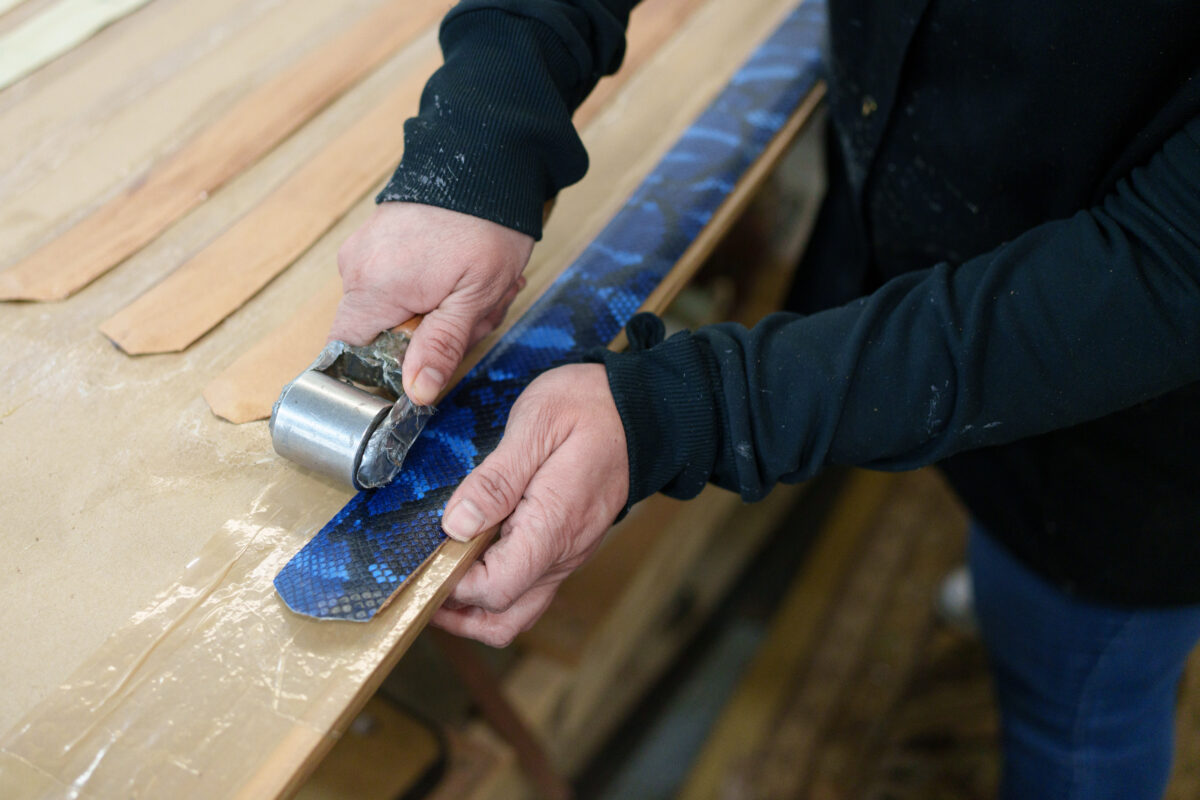

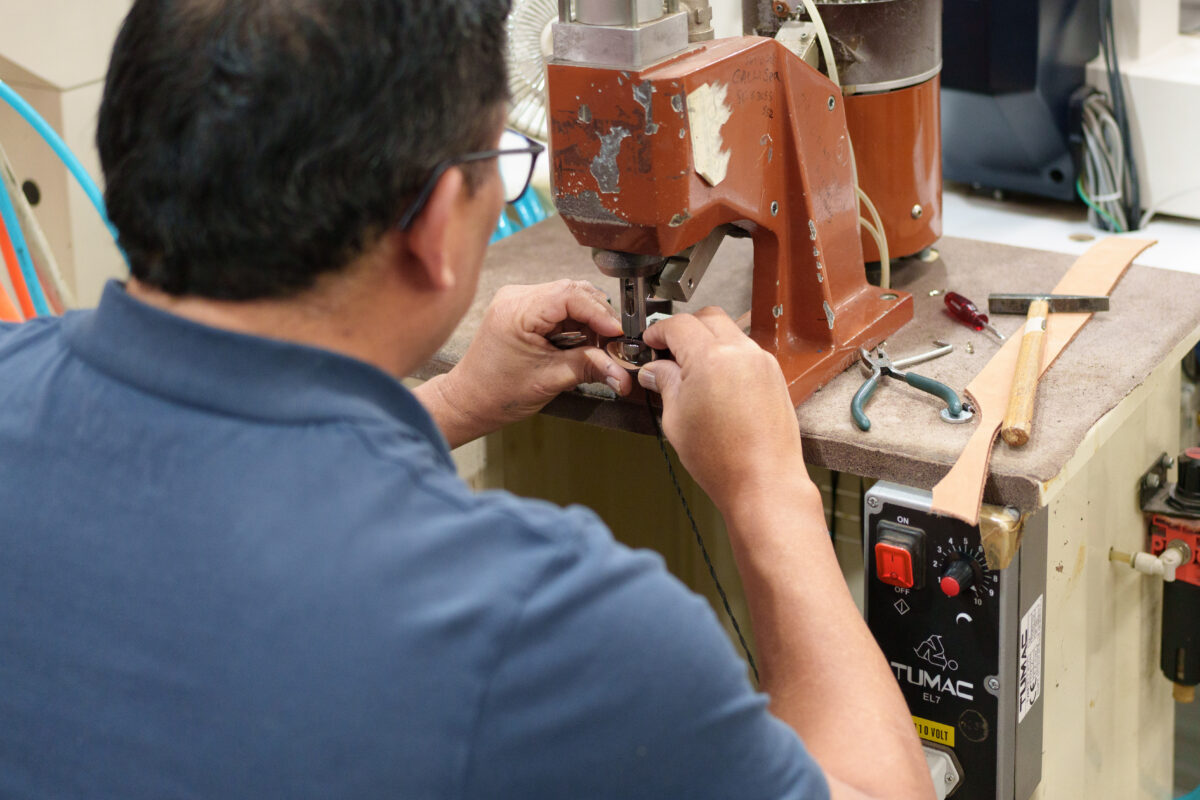
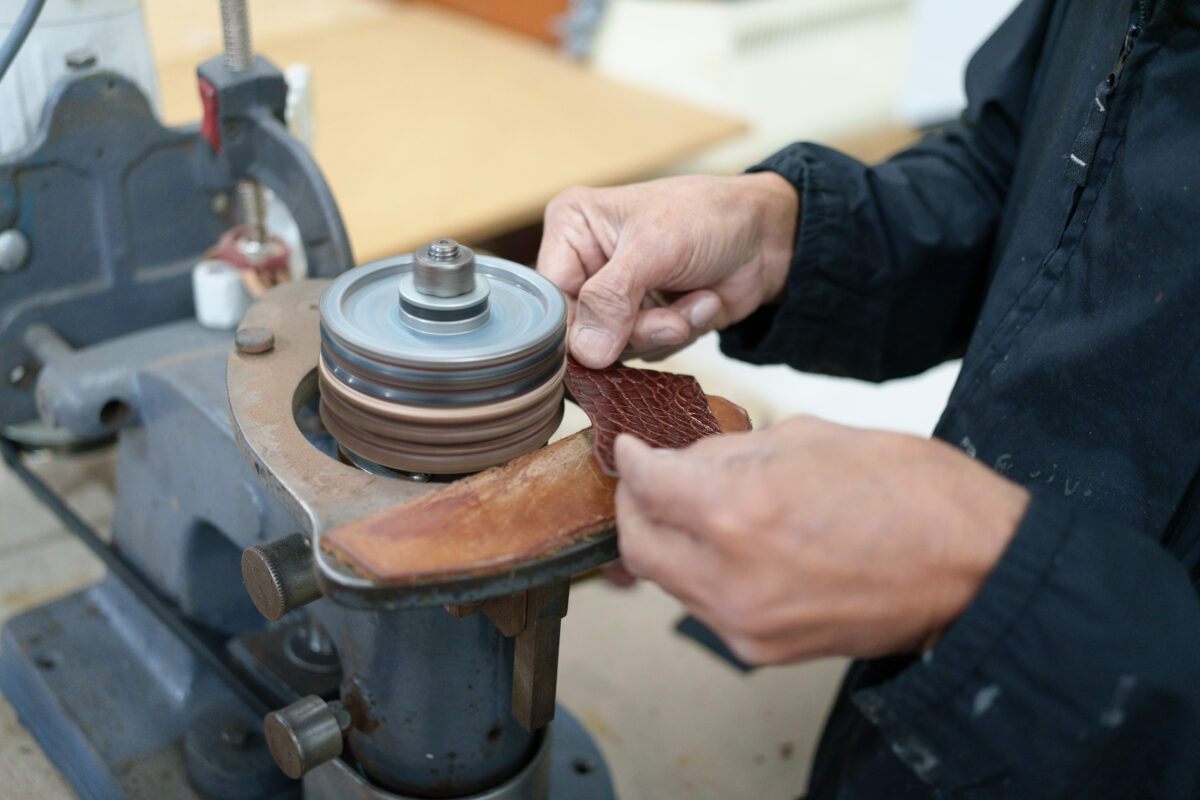
In an era of fast fashion and mass production, there’s something almost radical about a belt that takes days to make, especially one where 15 pairs of hands touch every stitch, buckle, and edge. But it’s something that happens at the w.kleinberg workshop on Collier Road every day.
William Kleinberg’s love of leather began with an alligator leather wallet he received as a child living in Montgomery, Alabama. “I loved the look and feel of it,” he says. That early fascination stayed with the University of Alabama graduate as he searched for a business idea post graduation that didn’t require substantial start-up capital. The aha moment came during a belt shopping adventure, when he was searching for an alligator belt for himself and couldn’t find what he was looking for.




Kleinberg partnered with his girlfriend at the time, a scarf designer for Echo in New York, to create an alligator belt for women. She designed the buckles, while he arranged manufacturing. “It wasn’t even the right way to make buckles,” he laughs, remembering how green they were at the time.
Despite having no prior fashion experience, Kleinberg, then in his early 20s, knew he was on to something, filling a gap in the market for quality, well-priced alligator belts for women. He says the belts are a hallmark of classic Southern style. “Alligators are indigenous to the United States,” he explains. “You find them from Texas up to North Carolina. It’s a Southern thing.”
Armed with five prototypes, he headed to New York in 1984 to shop his products around to top magazines and stores. “I called Town & Country, Harper’s Bazaar, Neiman Marcus, Bergdorf Goodman, Saks Fifth Avenue, and [San Francisco-based department store] I. Magnin,” he remembers. Subsequent conversations from that first trip landed Bergdorf Goodman as his first wholesale customer, which remains a customer to this day.
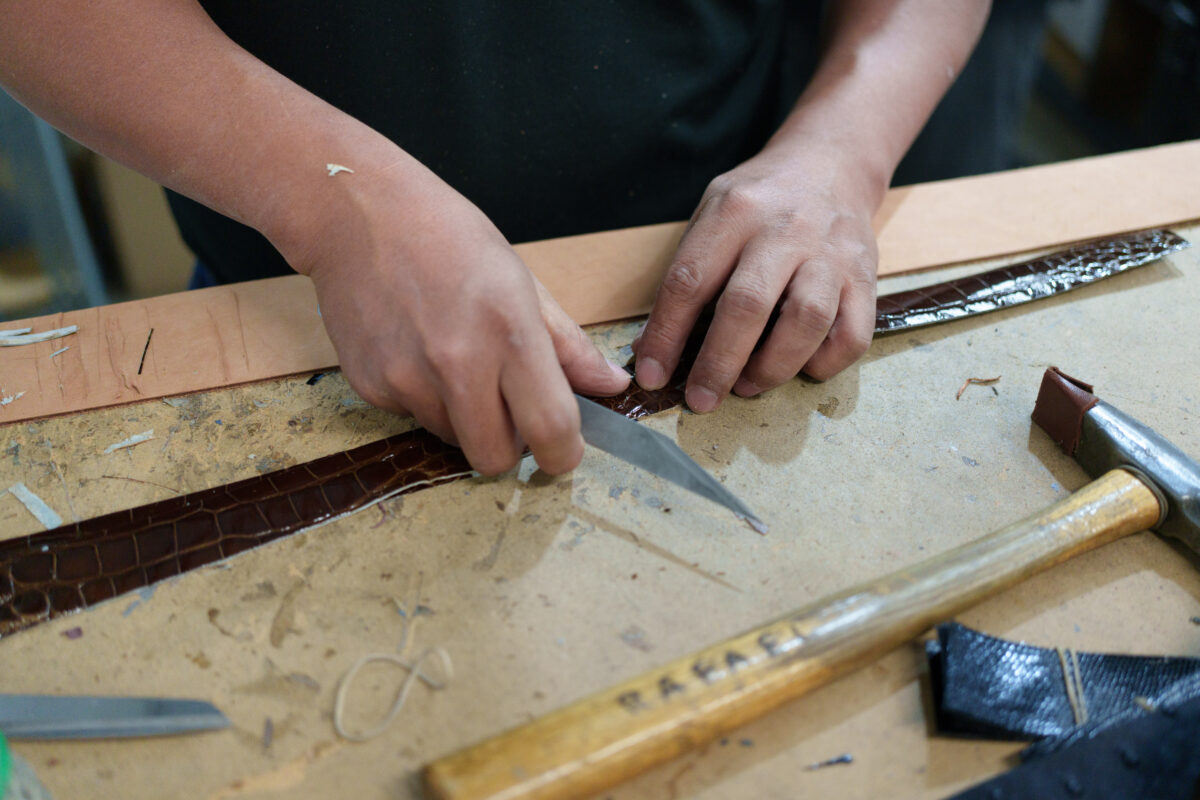

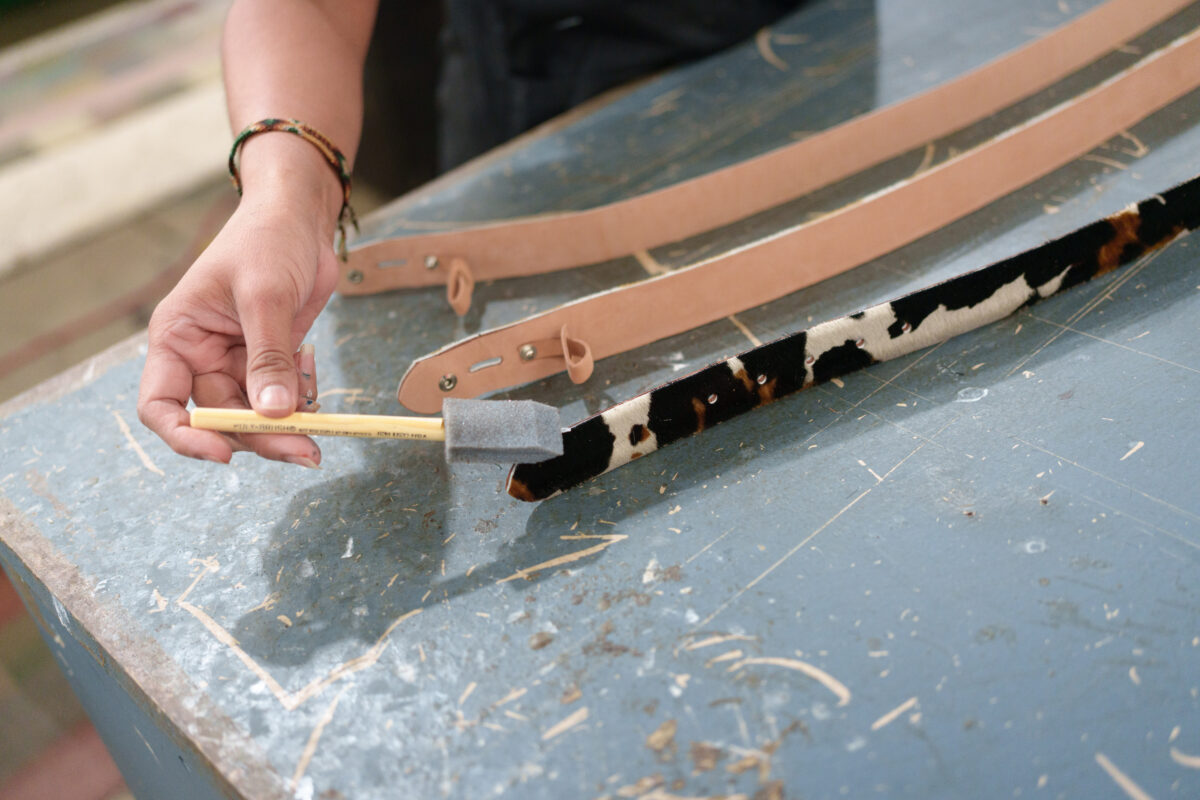
That confident start launched 40 years of a successful leather and exotic skins business, with a workshop based in Buckhead. The family-owned company now sells 42 colors of alligator, in addition to dozens of other types of leathers and skins, under the w.kleinberg label. “We have cayman crocodile, ostrich, python, textured leathers, corded stretch belts, you name it,” he says. The combinations are seemingly endless, with thousands of options for the discerning customer. “We make about 25,000 w.kleinberg belts a year,” he says.
Beyond belts, w.kleinberg has expanded into other luxury leather goods, including wallets, handbags, and even exotic leather dog collars, crafted by the same master artisans who create their signature belts on site. The brand also has buckles made from .925 sterling silver, zinc, brass, and nickel-free plate, offering customers the option to mix and match straps and buckles for truly personalized pieces.
Kleinberg employs 20 people, about a dozen of whom touch every single belt. Each piece is made to order and crafted by hand, with all designing, manufacturing, and shipping happening at the facility. This centralized operation allows the company to maintain strict quality control.
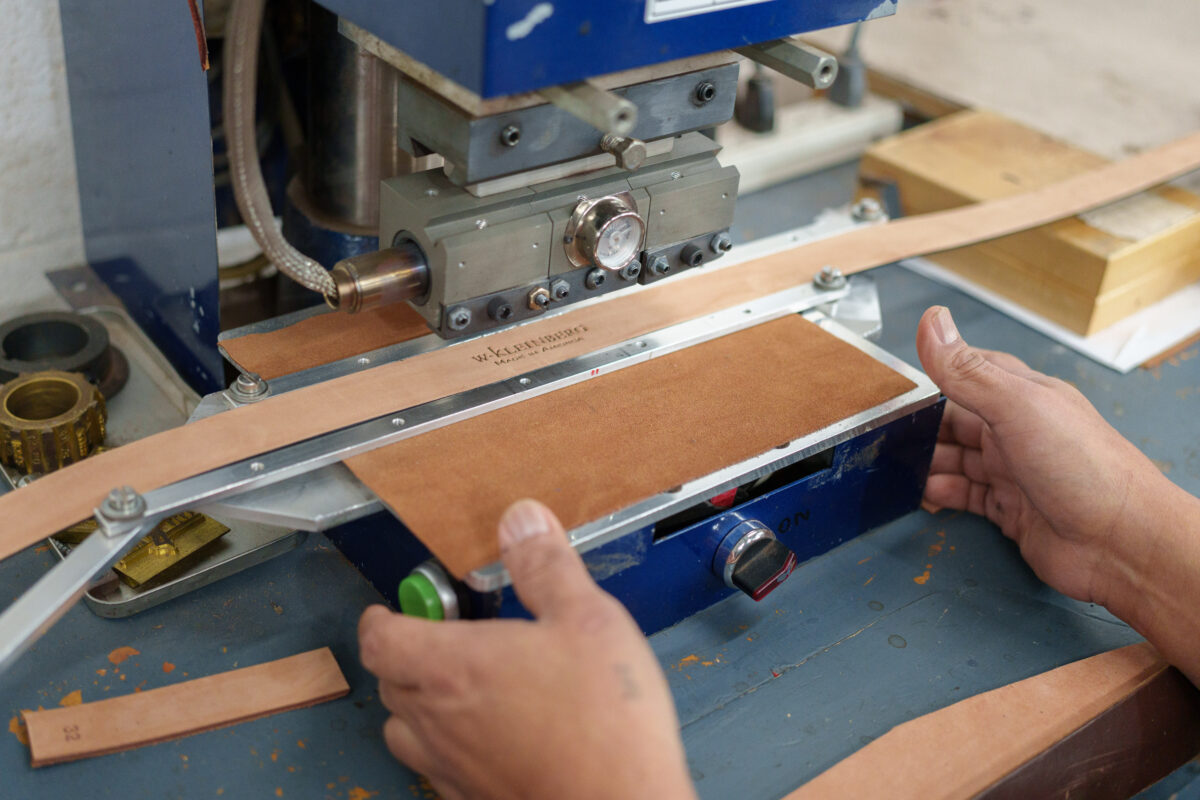
The company also wholesales to hundreds of stores around the country, private labels for some of the biggest names in menswear, and has a robust digital presence selling belts worldwide. But the most special thing about the brand is that Atlanta customers can visit the showroom to experience the made-to-measure process and meet the artisans working behind the scenes.
“We love when customers come in to get the full experience of us pulling out the leathers, the buckles, and everything,” he says. He especially likes it when customers bring in shoes or clothes that they’re trying to pair with a custom belt. Appointments are strongly recommended, although the showroom is open daily from 10 am to 5:30 pm. All the leathers are sourced from the best international tanneries; ostrich comes from South Africa, crocodile is sourced in Colombia, and calf leather is produced in Italy.
“We start with the highest quality materials, and our craftspeople bring it all together into beautifully made belts, created to last,” he says. The company is also committed to responsible sourcing and manufacturing processes that produce minimal waste. While Kleinberg spends considerable time and attention finding his materials, the made-to-measure belts can be ready in a matter of days.
Kleinberg considers himself to be fairly stoic and prefers to be on the manufacturing and sales side rather than as the face of the brand. But he does love it when he sees his customers delight in his products and return to have the experience in the workshop over and over again. “It’s a great feeling to see the belts being used,” he says. “I’m really proud of the people who make them. And I’m proud I’m still here.”
Piedmont Heart Institute performed a record-breaking 103 heart transplants in 2024, solidifying its position as a national leader in cardiac care and a cornerstone of the Buckhead community. This remarkable 29 percent increase from the previous year places Piedmont Atlanta Hospital among the top four busiest heart transplant centers in the entire country.
For more than a century, Piedmont Atlanta has been a pillar of the Buckhead community. The hospital has served generations of local families through every stage of life since moving to its iconic Peachtree Road location in 1957. From its comprehensive maternity and newborn services that welcome new residents into the world to its advanced specialty care, Piedmont is the trusted healthcare provider for countless Buckhead residents.
This level of success is built on a foundation of philanthropic trust and strategic investment, powerfully illustrated by the creation of the Marcus Heart Valve Center. Fueled by a transformative $20 million grant from The Marcus Foundation, led by Home Depot co-founder Bernie Marcus, the center was established to be a “one-stop shop for patients with heart valve problems”. Mr. Marcus, one of Atlanta’s most influential philanthropists, expressed his confidence in the institution, stating, “Atlanta is the perfect place for this unique center, and Piedmont Heart Institute will make it happen”.
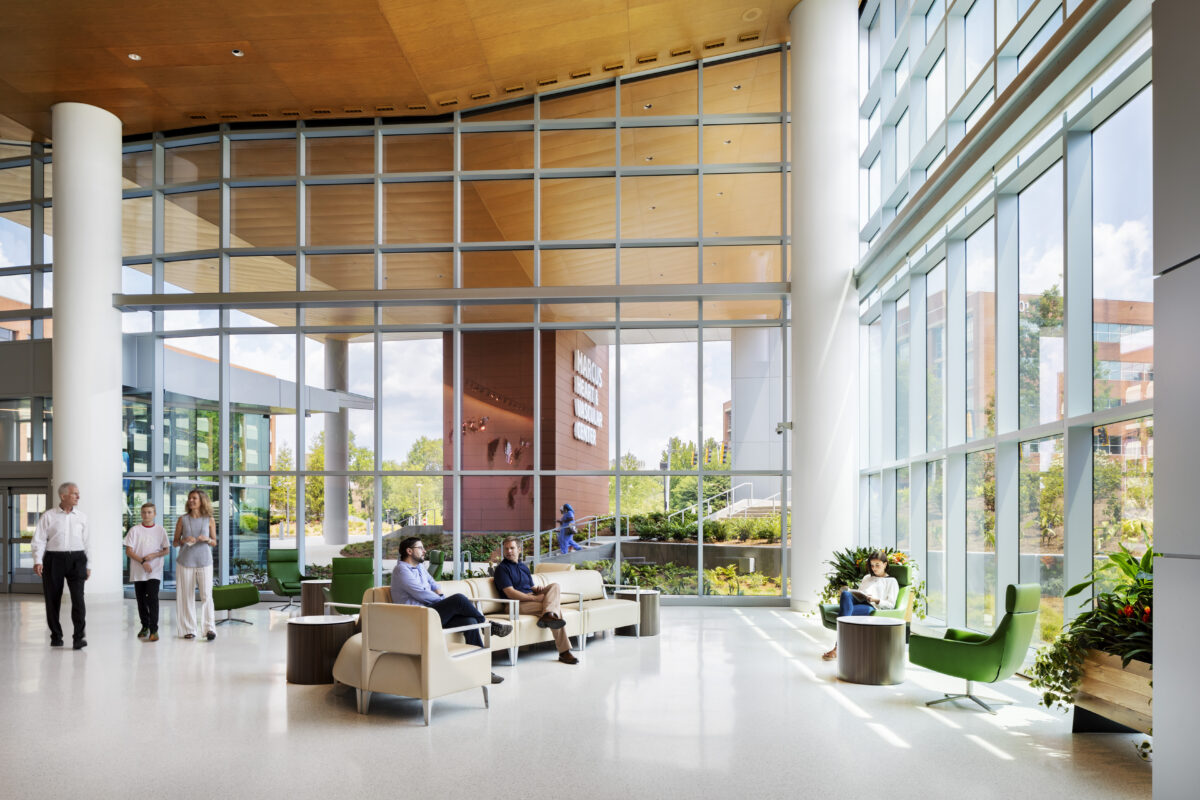
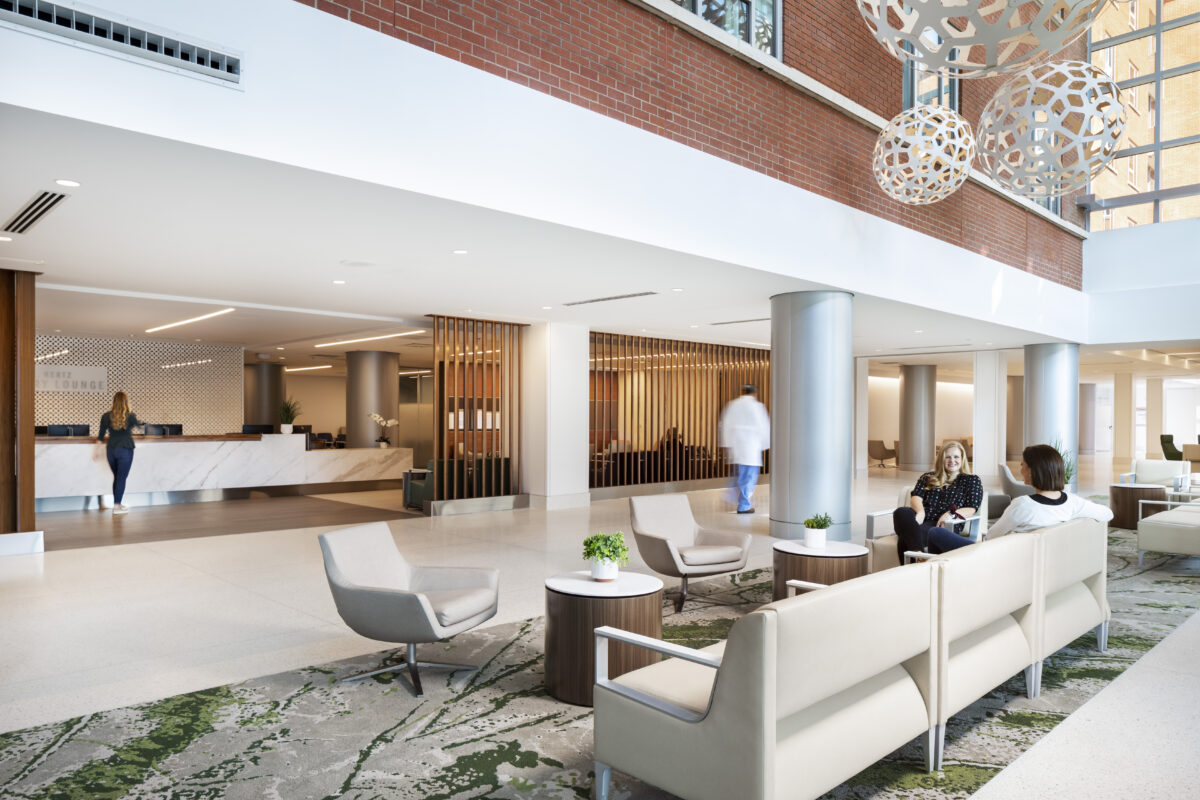
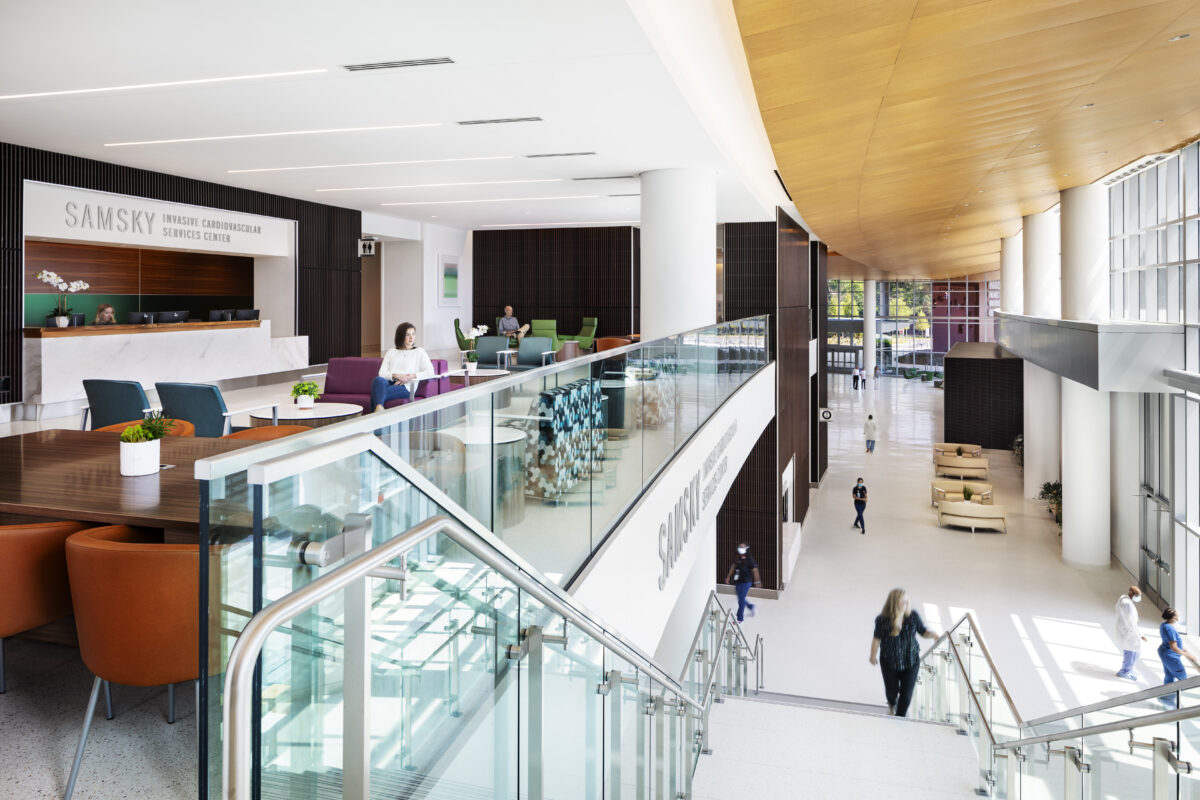
This investment established the nation’s first comprehensive center for care, training, and research for all four heart valves. Dr. Charles Brown, an interventional cardiologist at Piedmont, noted this generosity builds on a legacy of community support. “It started with the late J.B. Fuqua, after whom the Fuqua Heart Center of Atlanta was named, and it grows with Bernie Marcus’ trust that we will build a valve center worthy of his name,” Dr. Brown said. This powerful backing has helped propel Piedmont to the forefront of cardiac medicine.
This latest milestone elevates the hospital’s reputation to new heights. The 2024 transplant volume places Piedmont in an elite group of U.S. hospitals that includes Cedars-Sinai in Los Angeles, Vanderbilt University Medical Center in Nashville, and Mayo Clinic. The institute’s success is built on more than just numbers; since its inception in 2012, the program has completed over 375 heart transplants, demonstrating a long-term commitment to saving lives.
“Our emphasis on equitable access, in combination with implementing a responsible assertive organ acceptance approach has led to superb post-transplant outcomes,” said Dr. Ezequiel J. Molina, Director of Advanced Heart Failure and Heart Transplantation at Piedmont. He noted this strategy results in “shorter wait times, lower mortality rates on the waitlist, and the highest one-year survival rates in Georgia.”
Piedmont’s innovation extends to complex, multi-organ procedures. In 2024, the team launched a dual heart/kidney transplant program, successfully completing 13 of these intricate surgeries. A new heart/liver transplant program has also been recently established, further expanding options for patients with complex conditions. Alongside this, the hospital remains the nation’s leader by volume for Left Ventricular Assist Device (LVAD) implants, a critical therapy for patients with advanced heart failure.
The achievement is a point of pride for the entire hospital staff and its partners. “Our team is passionate about finding new ways to serve our patients and it is reflected in the volumes we have seen the past two years,” said Dr. David Kandzari, Chief of Piedmont Heart Institute. He gave special credit to the crucial role played by LifeLink of Georgia, the state’s Organ Procurement Organization.
The need for such advanced cardiac care is growing, with over 6 million adults in the U.S. living with heart failure. As of today, nearly 4,000 Americans are waiting for a new heart. With this record-setting year, the world-class team right here in Buckhead is making a major impact on that national crisis.
“With the growth of our program, we hope to help more people with heart failure receive a new heart,” Dr. Molina added. For the Buckhead community, this means having one of the country’s absolute best heart transplant centers right in our own backyard.
The Atlanta Beltline has finalized the purchase of six additional parcels along Bennett Street, completing a 3.2-acre assemblage that will become a cornerstone of the Northwest Trail. The $18 million acquisition in August 2025, combined with the $11 million purchase of the former Elleven45 Lounge in late 2024, solidifies the Beltline’s control over a crucial nexus point where the iconic loop will cross Peachtree Road for the first and only time. This development is expected to serve as a major gateway between the Beltline and Buckhead’s most famous street.
This strategic acquisition is poised to transform a quirky, historically significant street into a major public access point for the 22-mile trail. For decades, Bennett Street has been a charmingly eclectic mix of art galleries, antique shops, and troublesome clubs. Its history is as varied as its storefronts, evolving from a humble country road where servants for Peachtree’s grand mansions resided in the early 20th century to a warehouse district and a vibrant nightlife hub in the 1970s.
Now, a new chapter is being written, one that envisions a future of increased connectivity, affordable housing, and vibrant commercial spaces seamlessly integrated with the Beltline’s path. The now-vacant buildings that line the street are slated for demolition, making way for a master-planned development that will be guided by an intensive community engagement process.
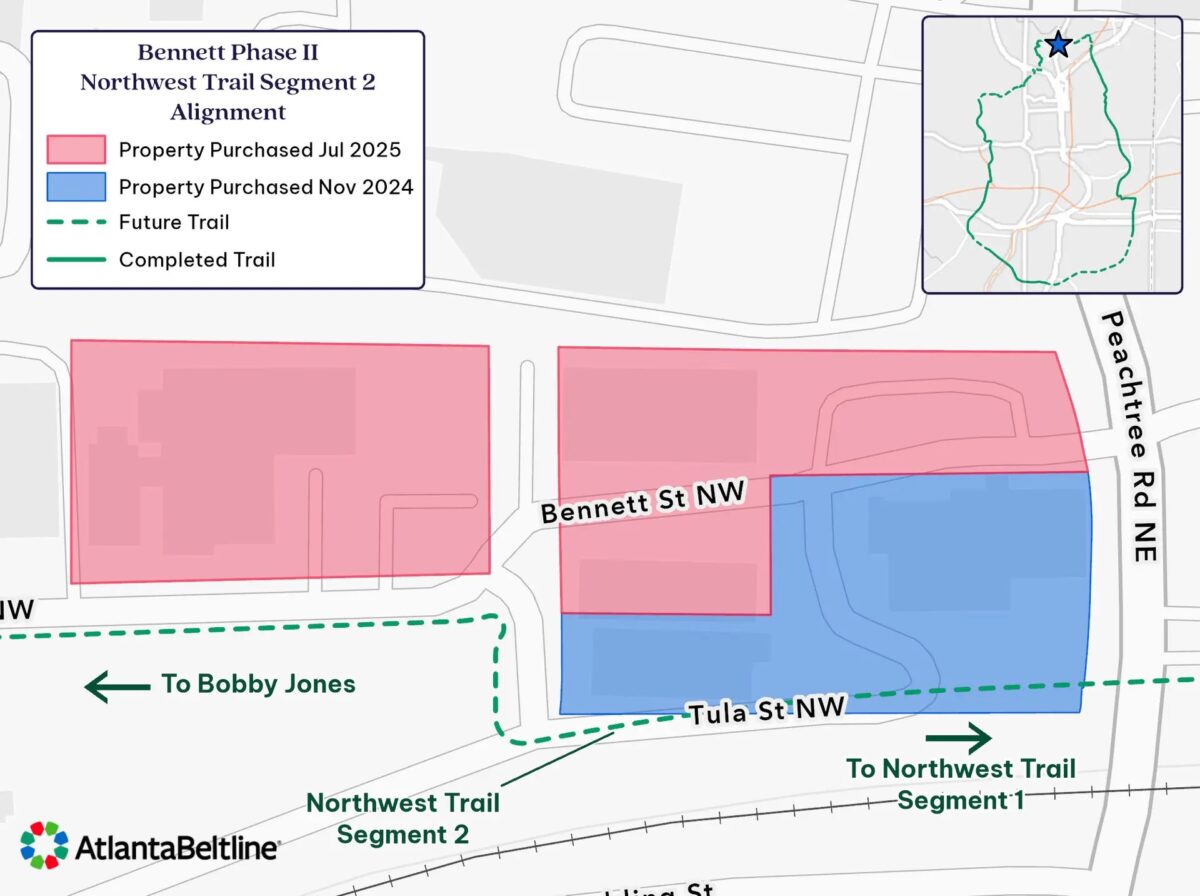
The significance of this location cannot be overstated. With The Shepherd Center and Piedmont Hospital—the largest employer in the Beltline Planning Area—just a stone’s throw away, the new gateway will provide a vital connection for thousands of healthcare workers, patients, and visitors. The vision, as articulated by Beltline officials, is to create a “complete community” where people can live, work, and thrive without relying on cars.
The remaining parcels on Bennett Street are owned by Onward Reserve, the popular men’s clothing retailer. TJ Callaway, CEO of Onward Reserve, expressed his enthusiasm for the project, telling the Atlanta Business Chronicle, “We’re excited [the Beltline is] doing all this and looking forward to working with them.” Callaway also noted that the retailer will be seeking third-party tenants for any space it doesn’t occupy in the new development, signaling a collaborative approach to the area’s future.
The Northwest Trail, which will eventually span 4.3 miles from Blandtown to Peachtree Hills, has been one of the most anticipated and complex segments of the Beltline. Unlike other sections of the loop that follow defunct rail corridors, the Northwest Trail has required a more intricate and creative approach to land acquisition and engineering. The Bennett Street crossing, for instance, will involve a partnership with the Georgia Department of Transportation to construct a new Peachtree Road bridge that will accommodate the trail passing underneath.
Recent progress on the Northwest Trail has been swift. Just in the past 60 days, construction has advanced on Segment 1, which includes a dramatic suspension bridge over Peachtree Creek. The bridge’s superstructure is now complete, and the trail on both sides of the creek is taking shape, with a targeted completion date of June 2026. This tangible progress, coupled with the landmark Bennett Street acquisitions, has generated a palpable buzz in the community.
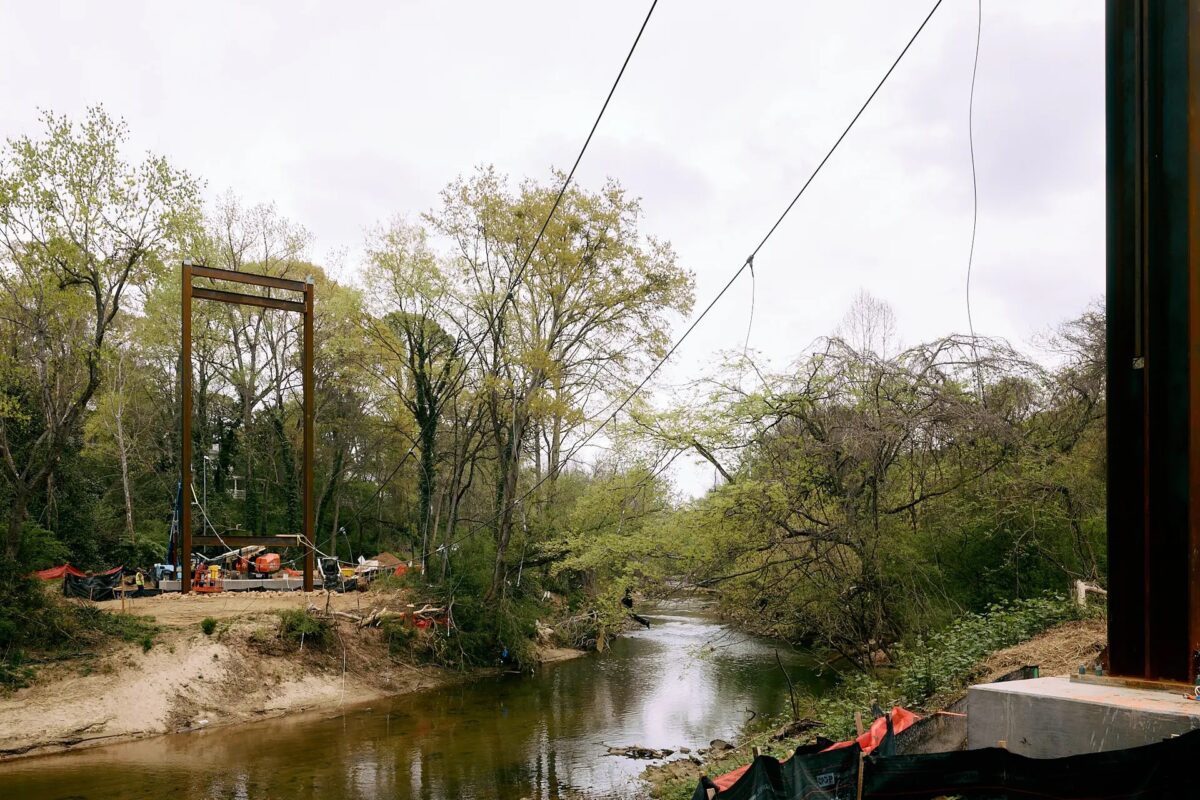
The Beltline’s ambitious plans extend beyond the trail itself. The recent announcement of a $3.5 billion light rail network, with a priority on access to Piedmont Hospital, underscores the transformative potential of this project. The integration of transit, trails, and mixed-use development promises to create a more connected, equitable, and sustainable Buckhead.
As the old buildings on Bennett Street prepare to come down, they make way for a future that honors the street’s unique character while embracing the promise of a more walkable Buckhead, directly connected to the best green spaces in the city. For the thousands who live, work, and play in the area, the transformation of Bennett Street can’t come soon enough.
Experience upscale city living in this spacious and light-filled 5th-floor residence at The Brookwood—one of Buckhead’s most sought-after addresses. This expansive 3-bedroom, 3-bath home (or 2 bedroom with a versatile den or home office) offers a sleek, open-concept layout highlighted by 10-foot ceilings, floor-to-ceiling windows, wide-plank wood floors in the living space and new carpet in the bedrooms.
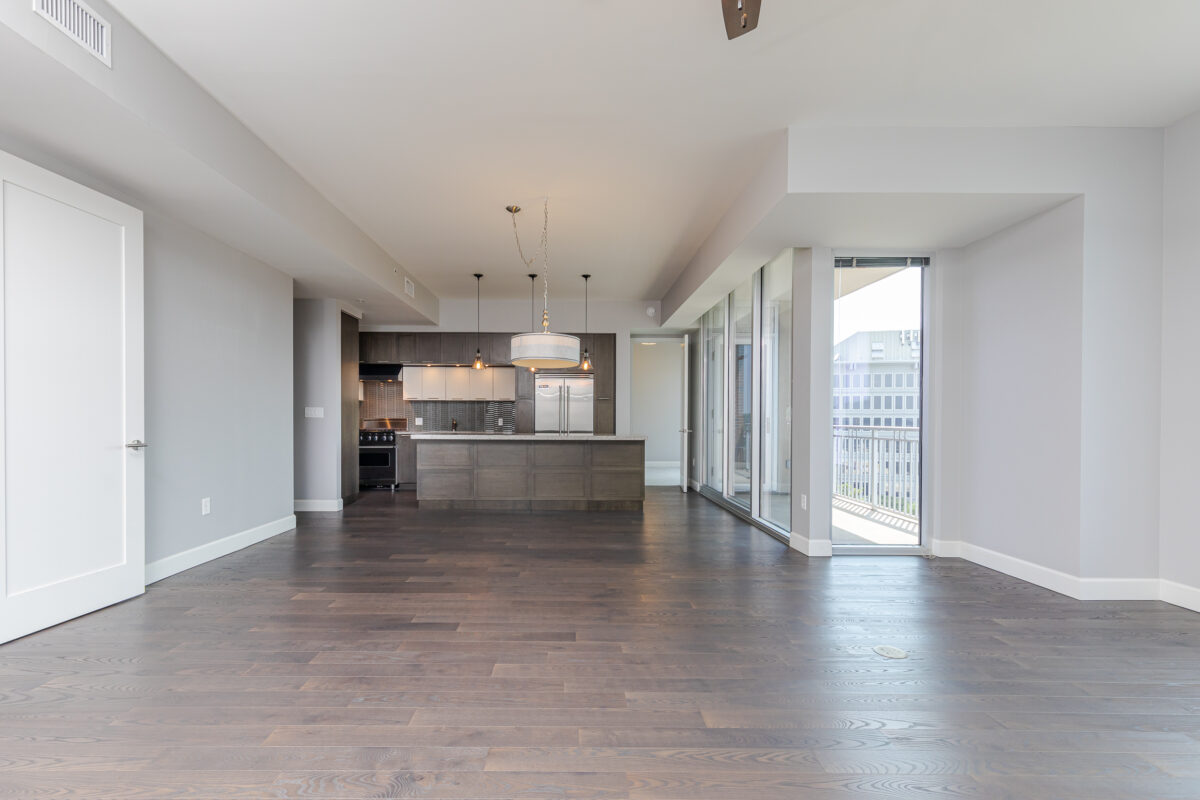
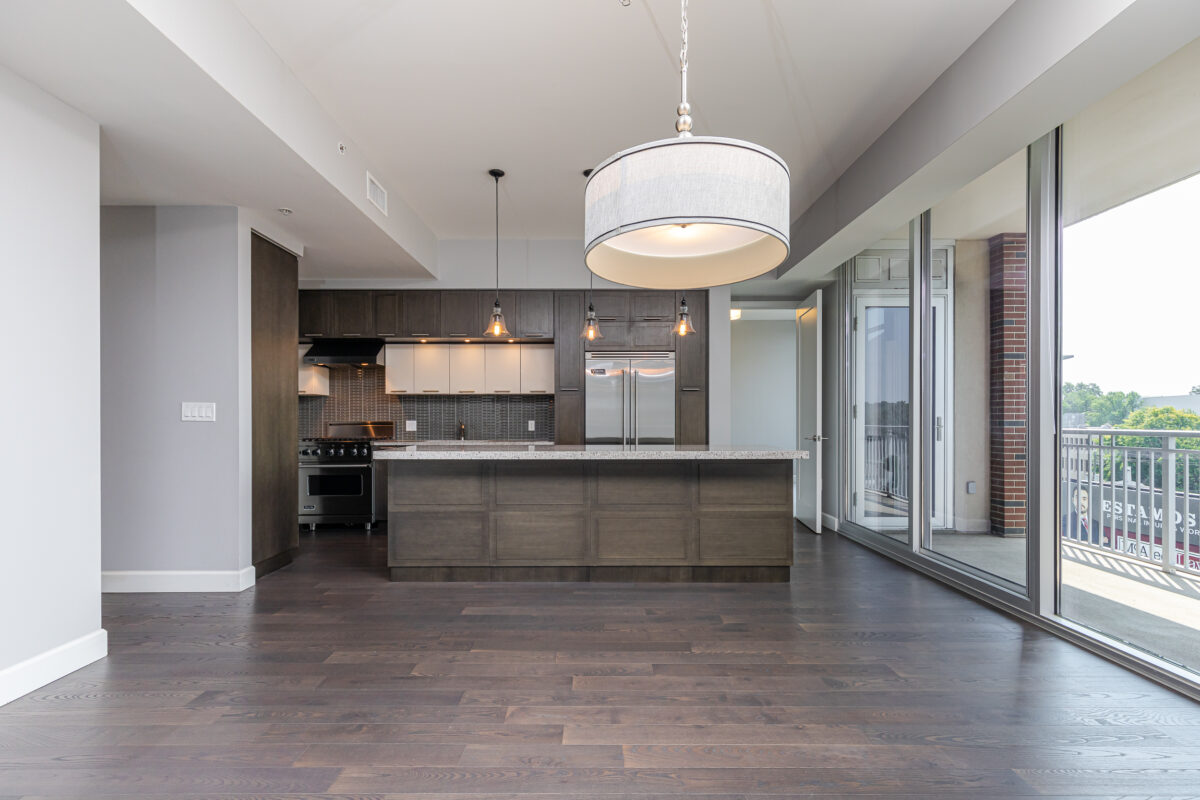
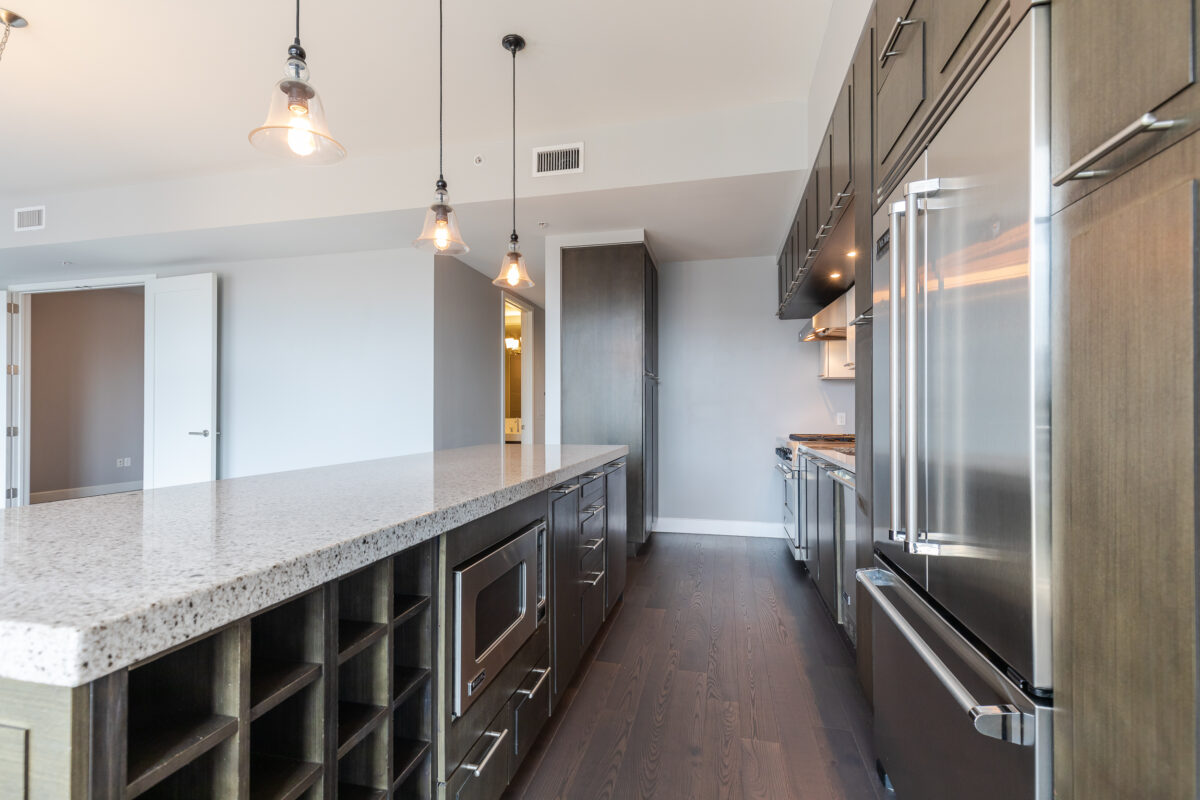

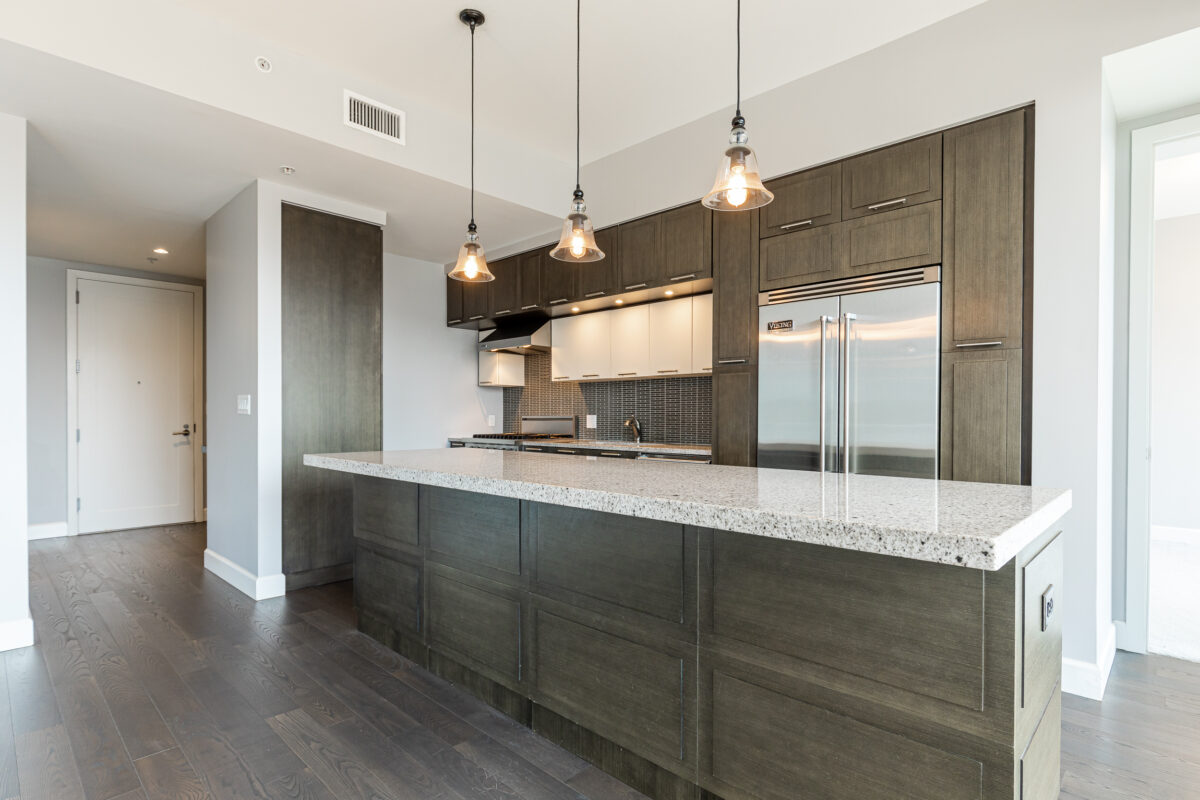
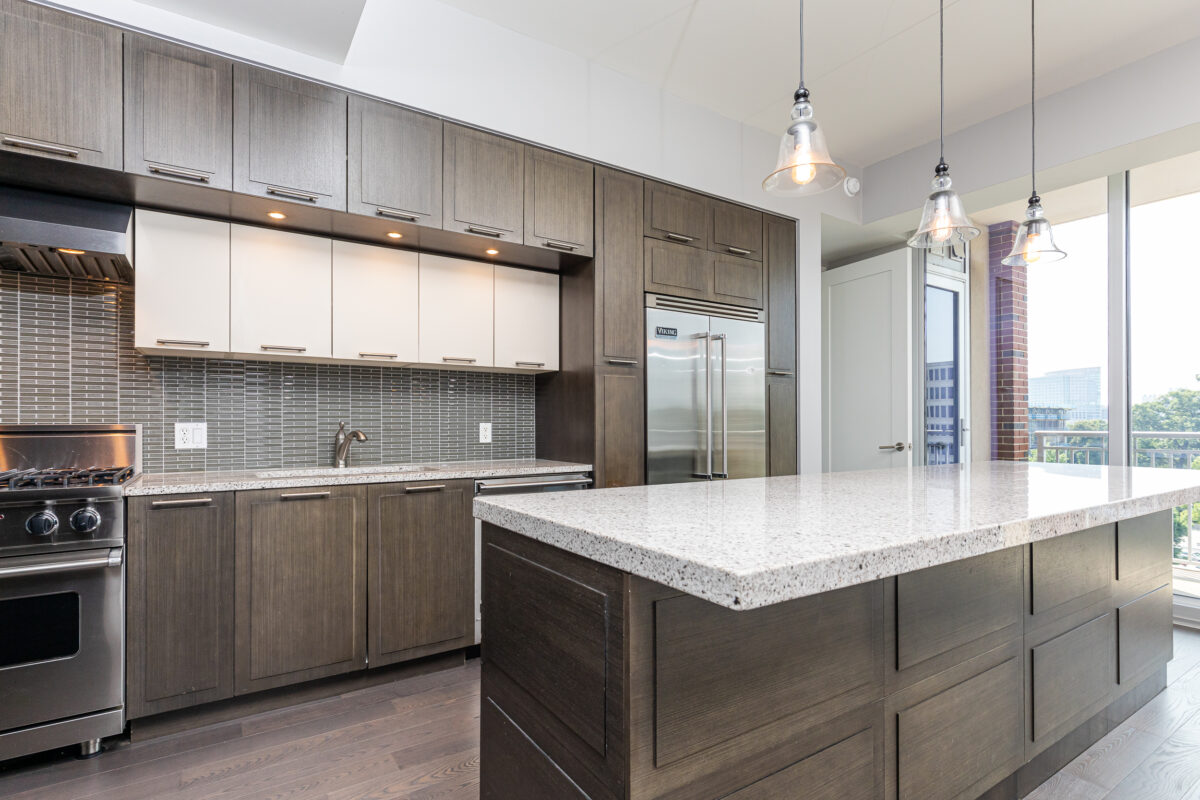
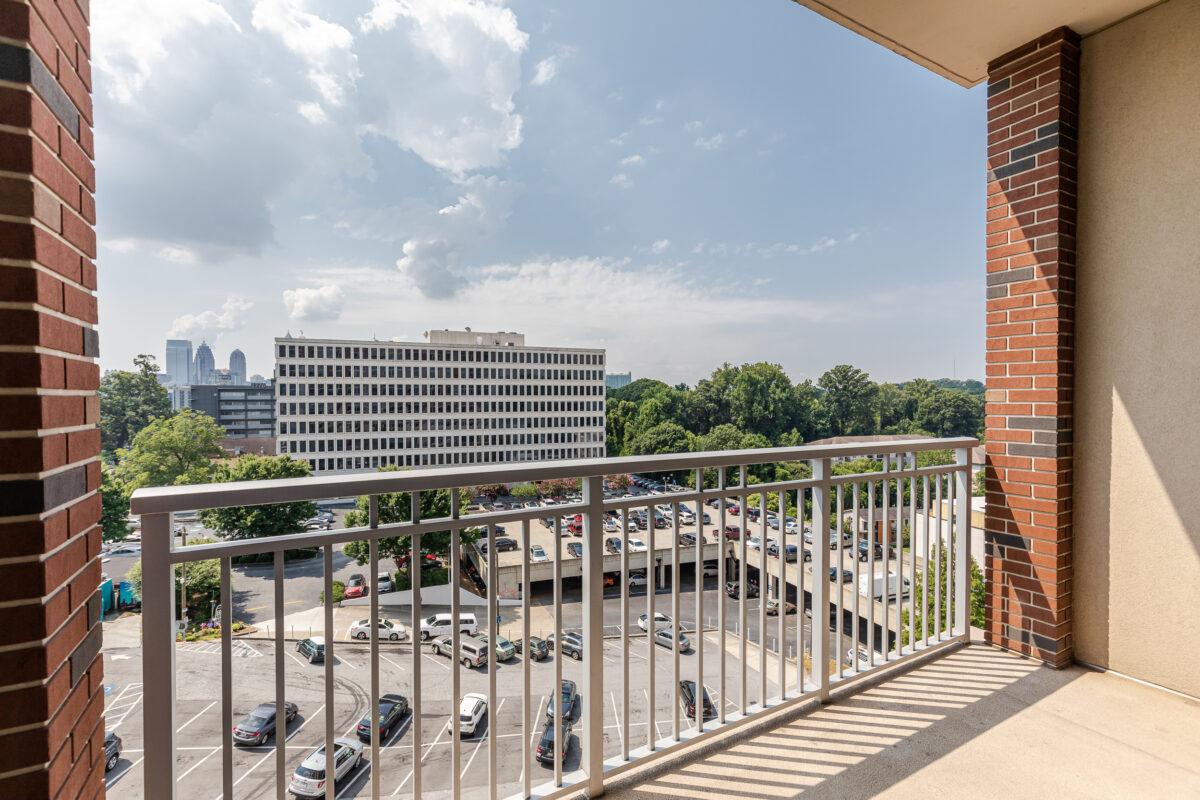
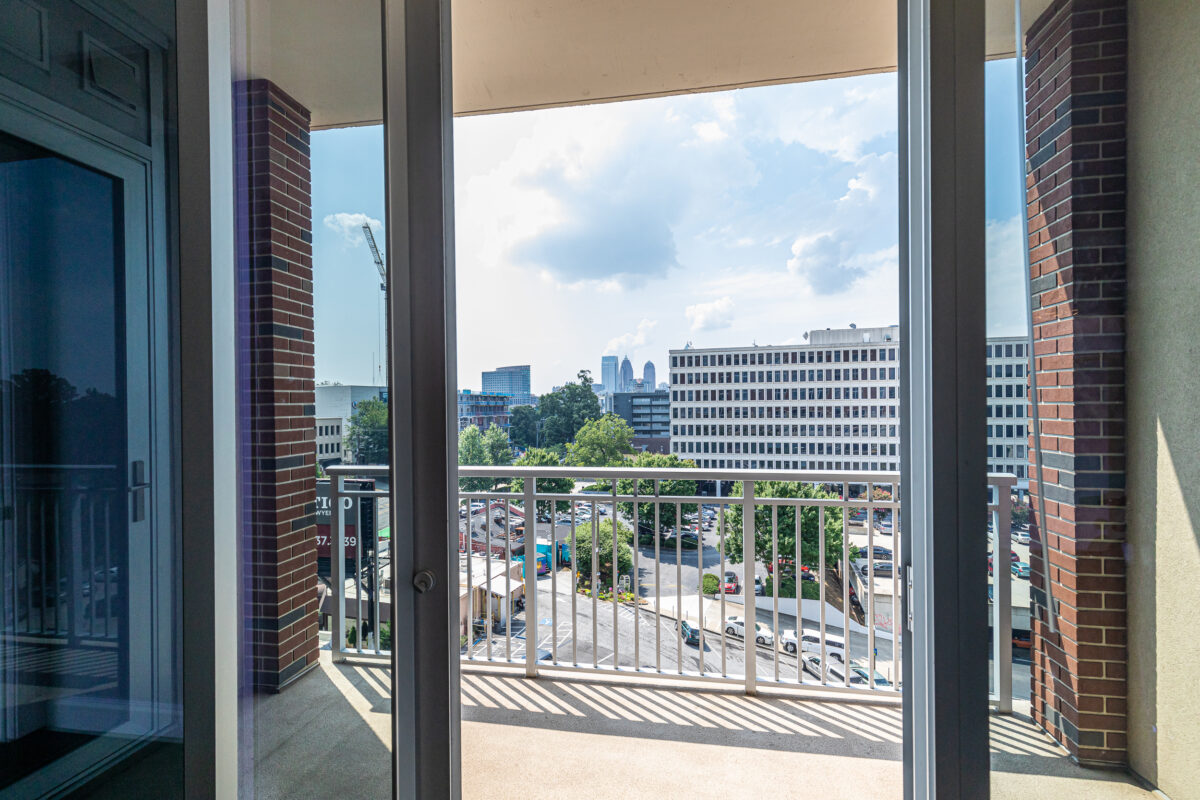
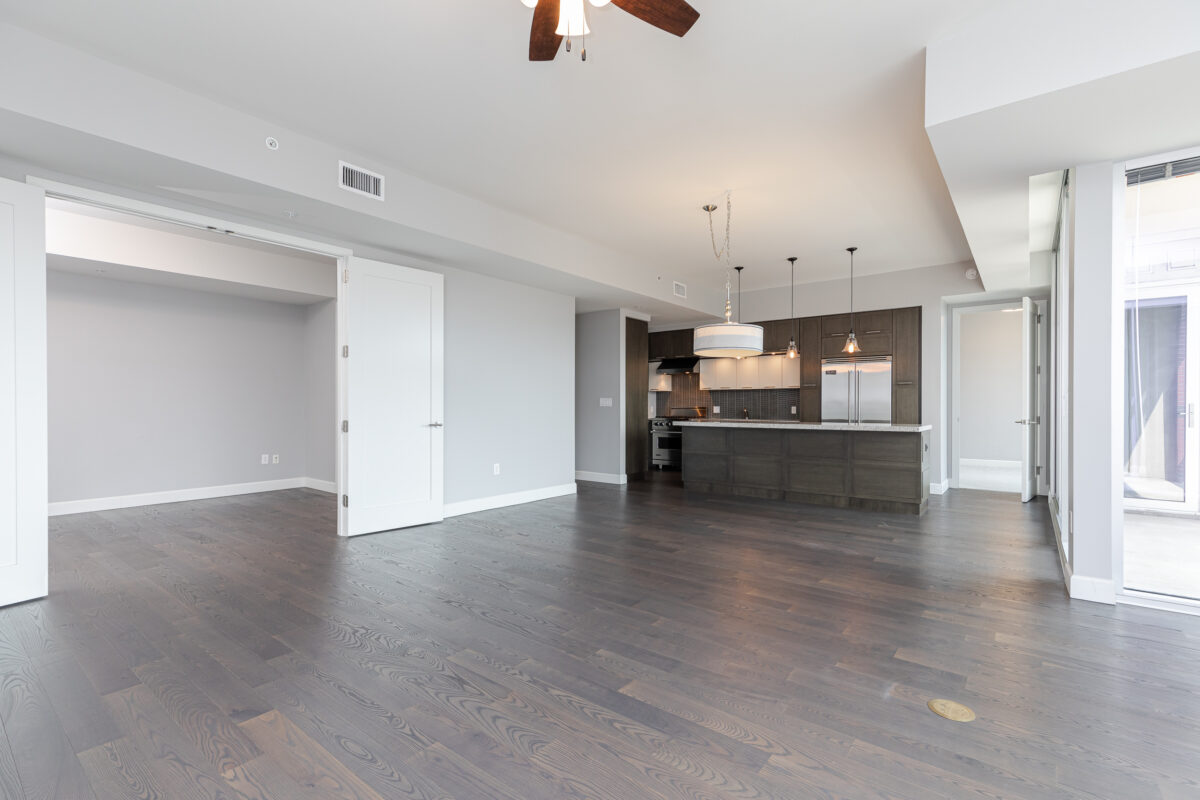
The gourmet kitchen features extensive cabinet space, top-of-the-line Viking stainless steel appliances, a large stone island perfect for entertaining and casual dining. The living area flows seamlessly to a private balcony, ideal for morning coffee or evening relaxation while enjoying the views beyond.
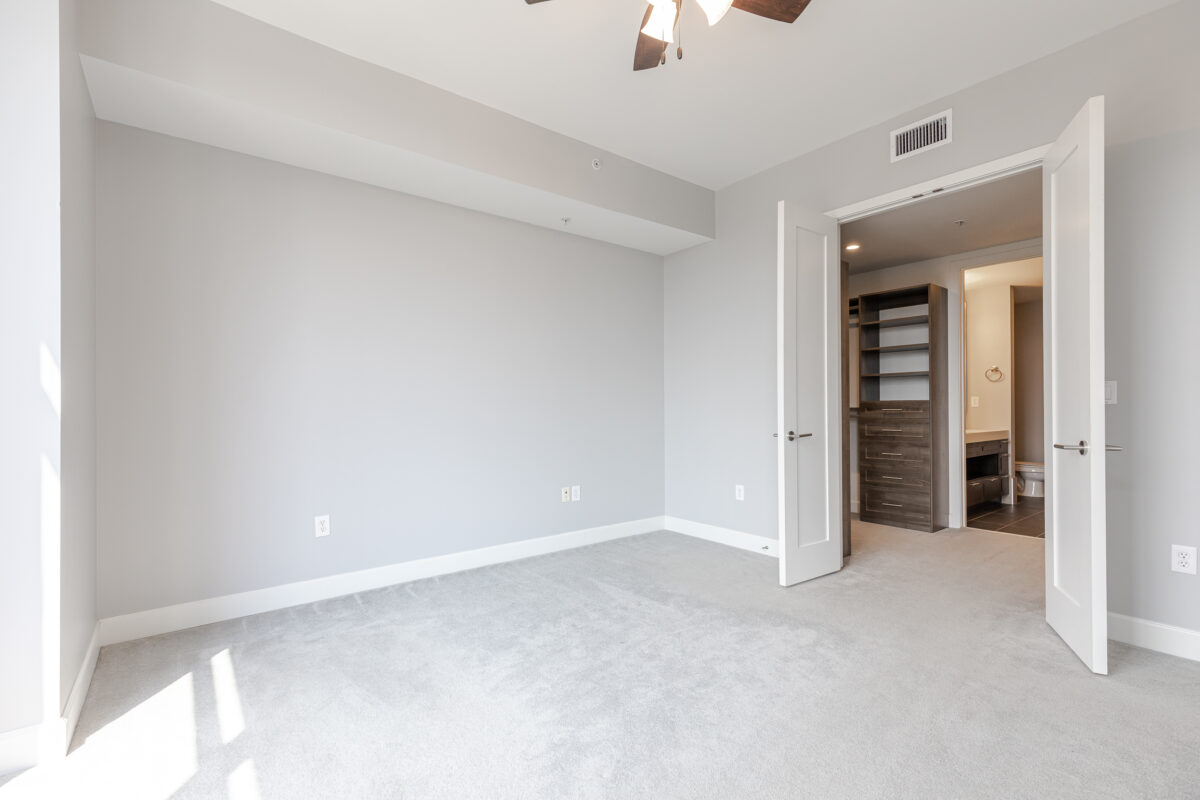
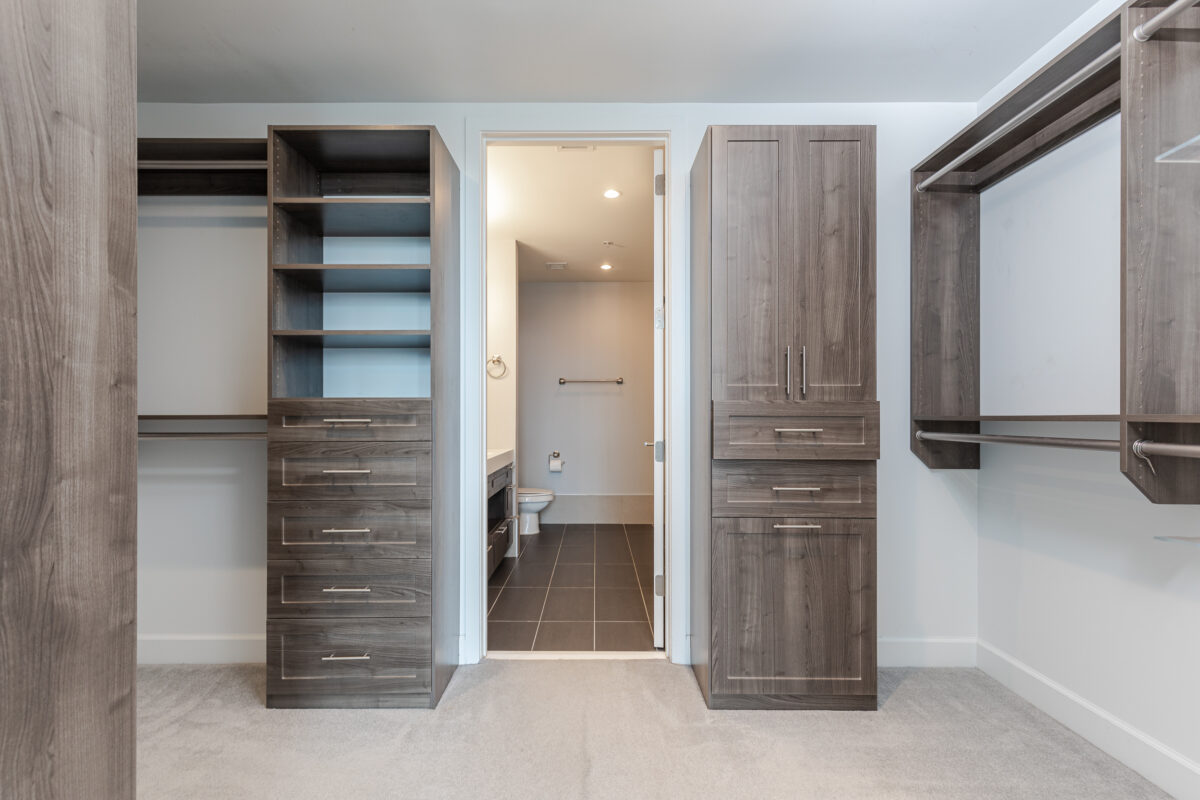
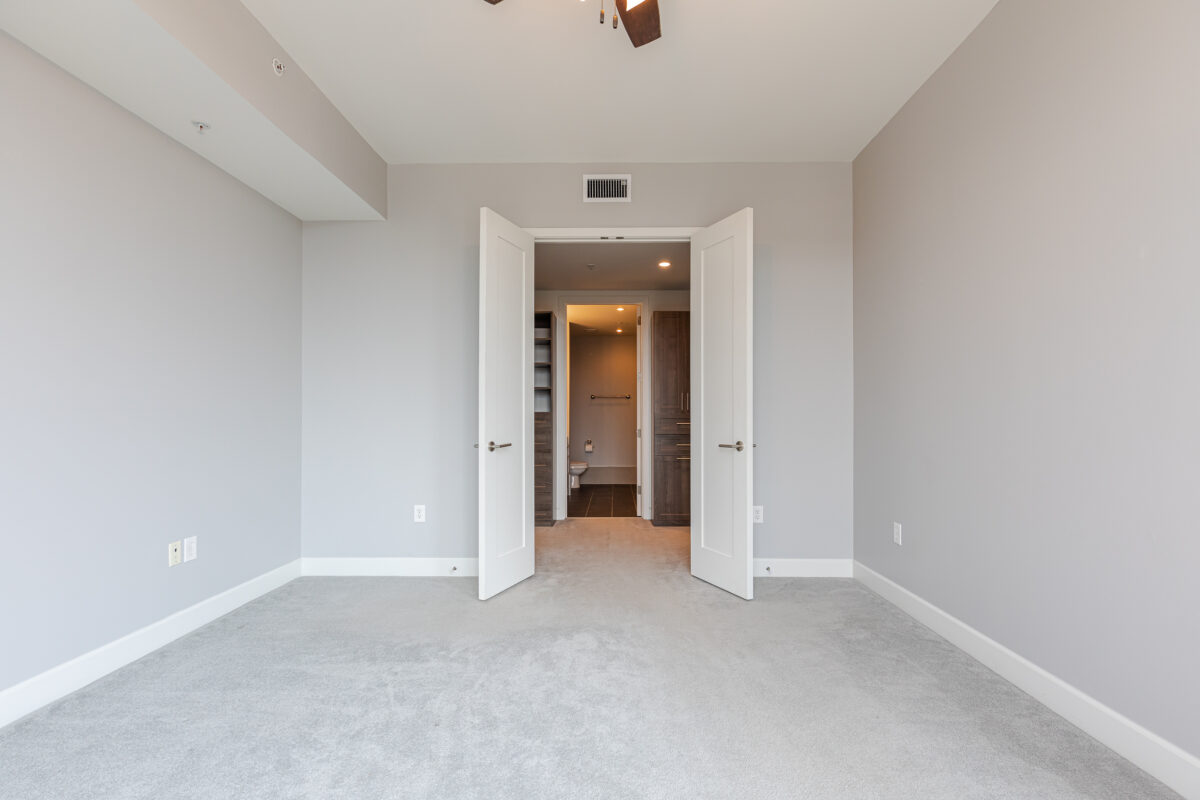
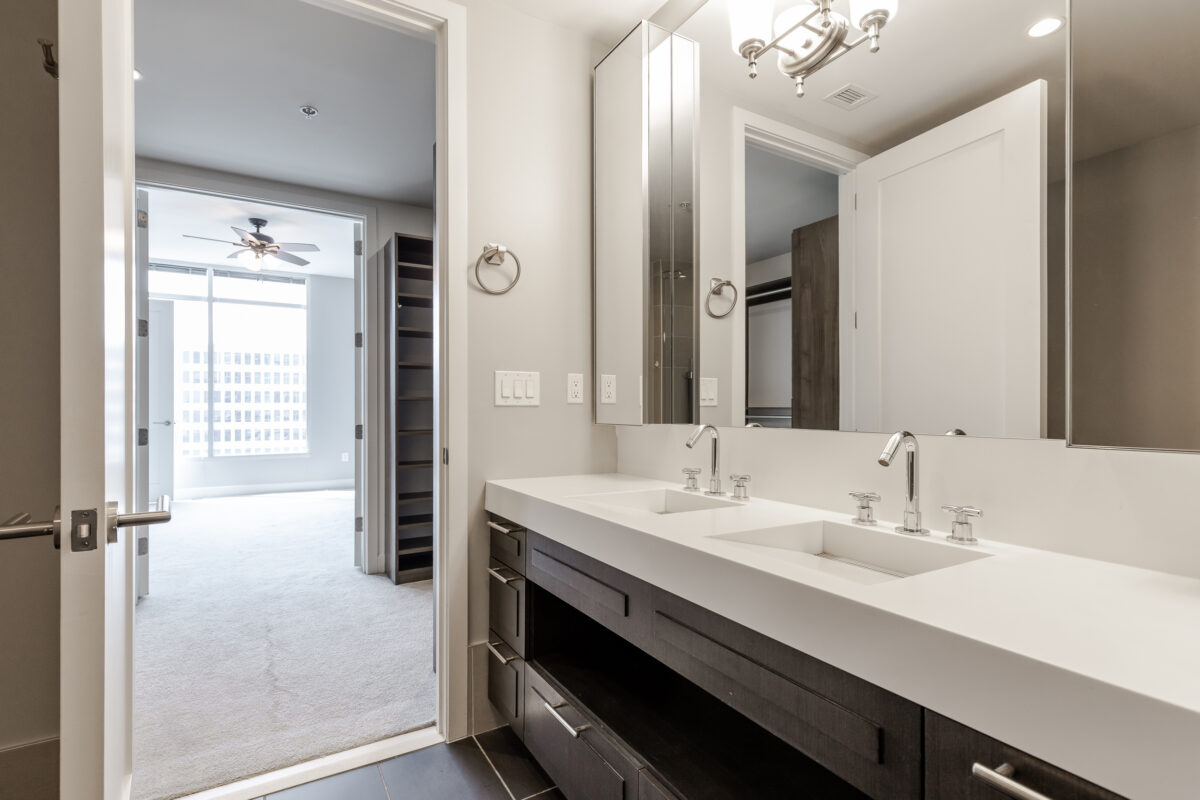
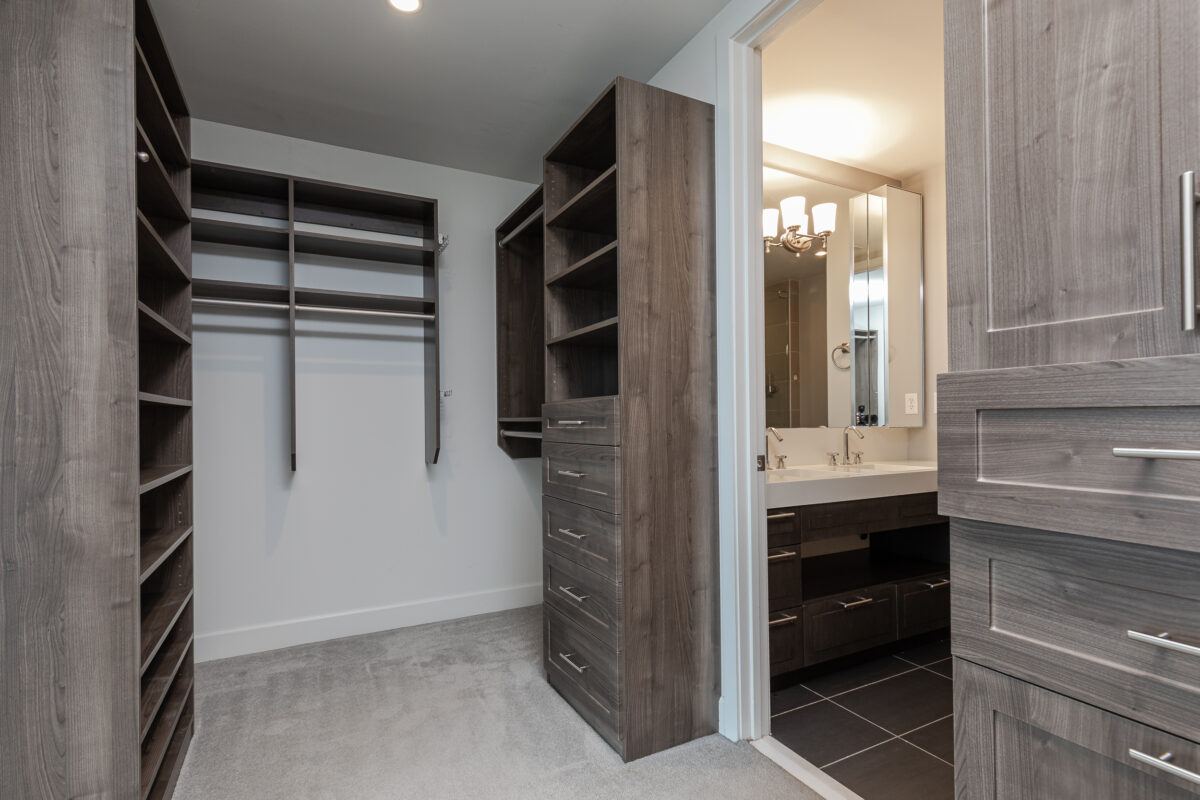
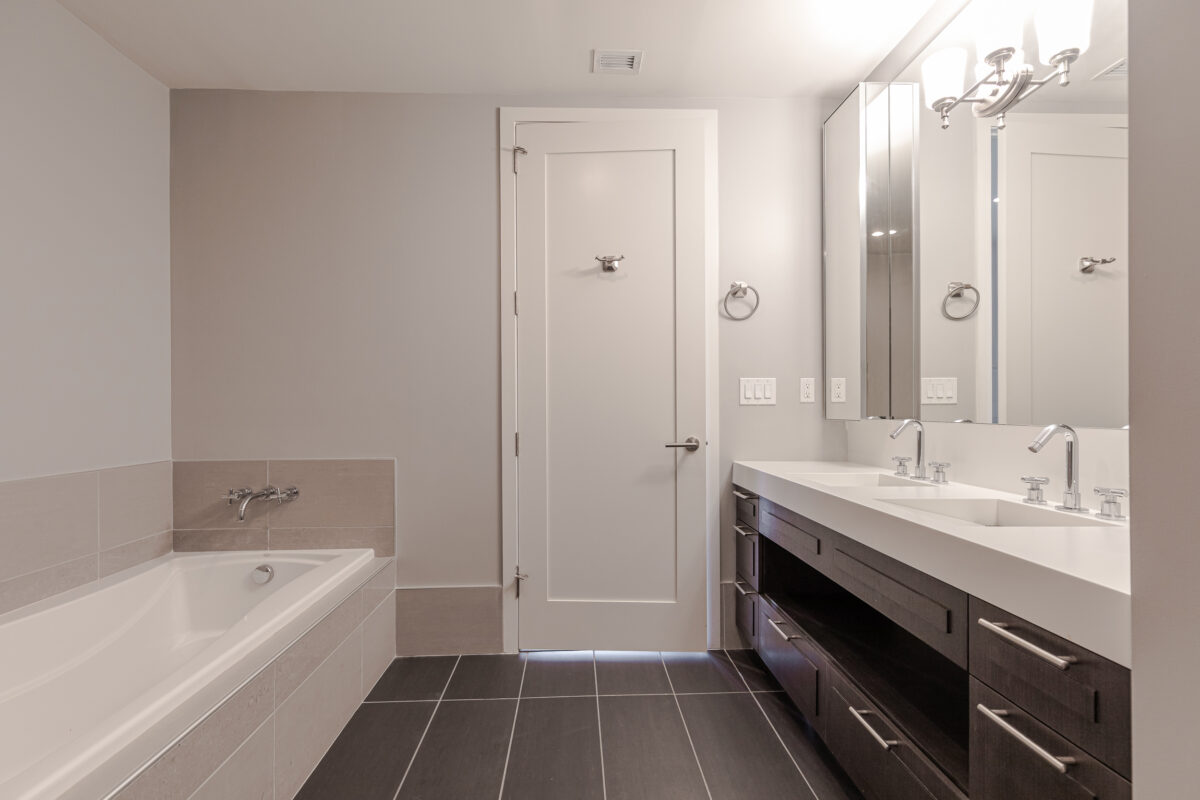
The oversized primary suite has custom-built closet and an ensuite bath, and the additional bedroom is great for guests. Enjoy the convenience of two assigned parking spaces.
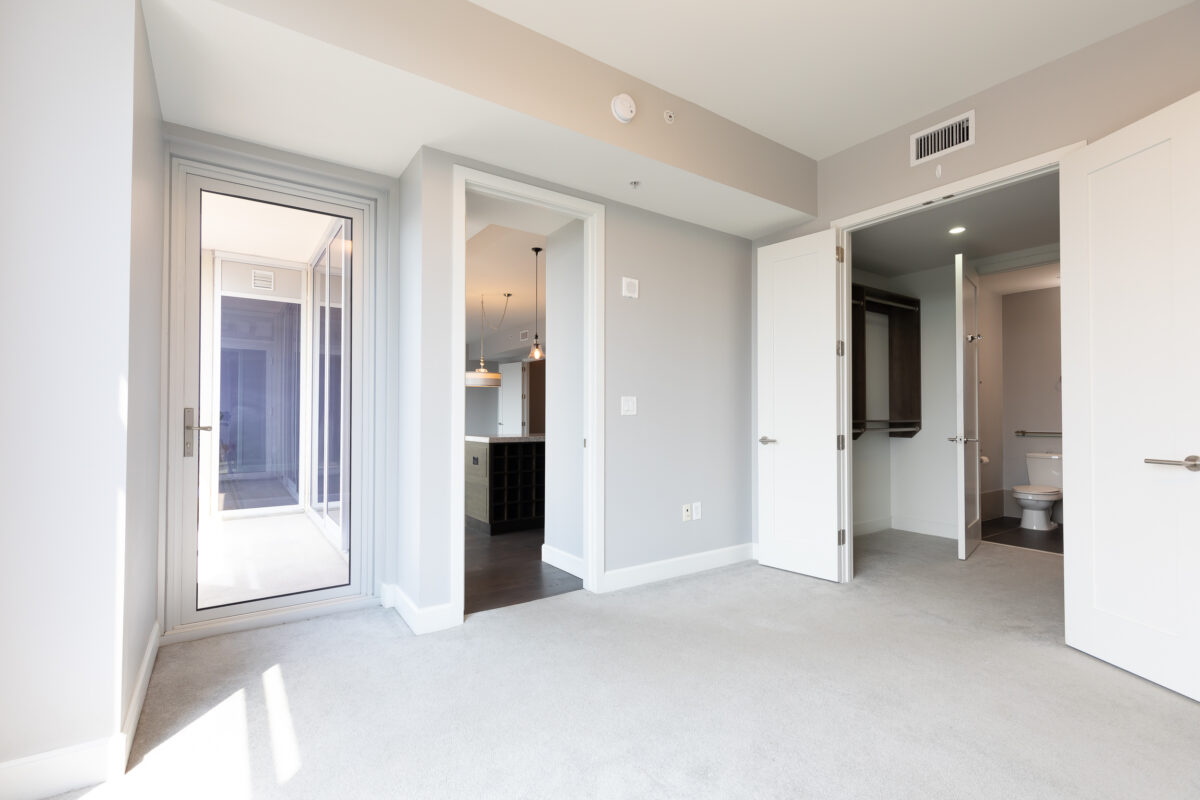
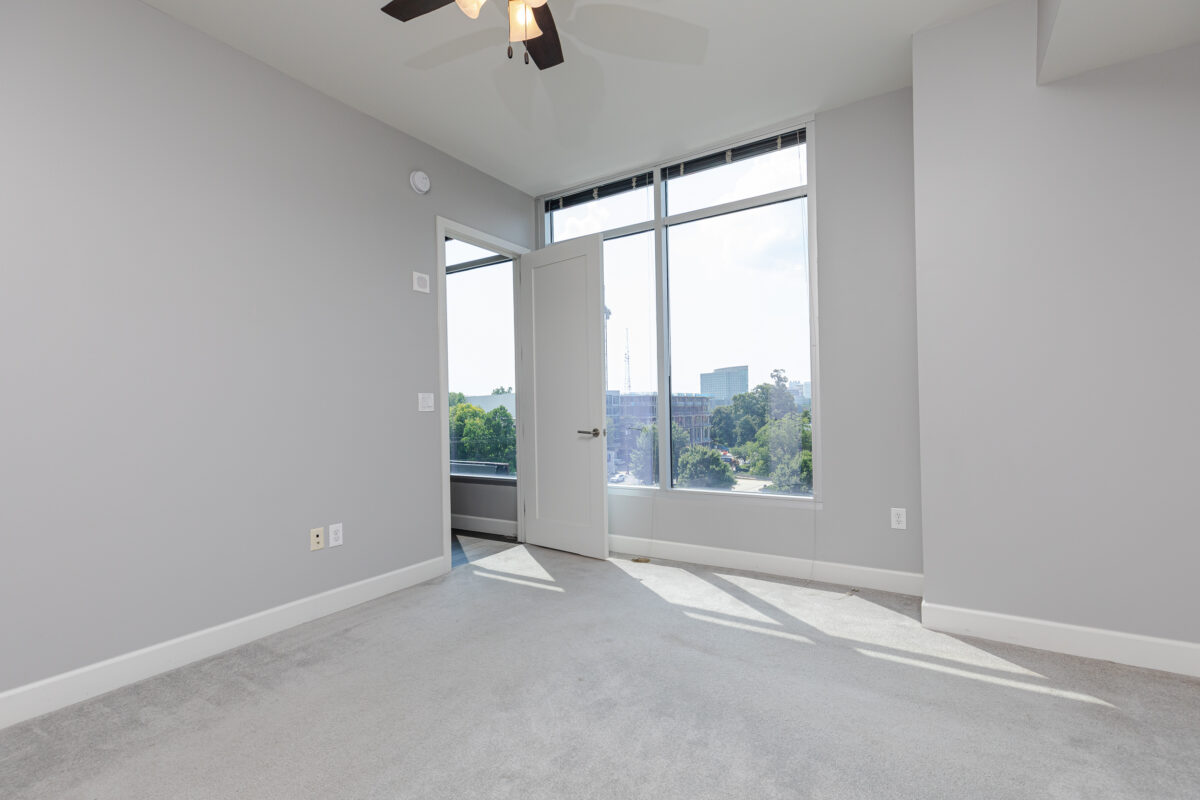
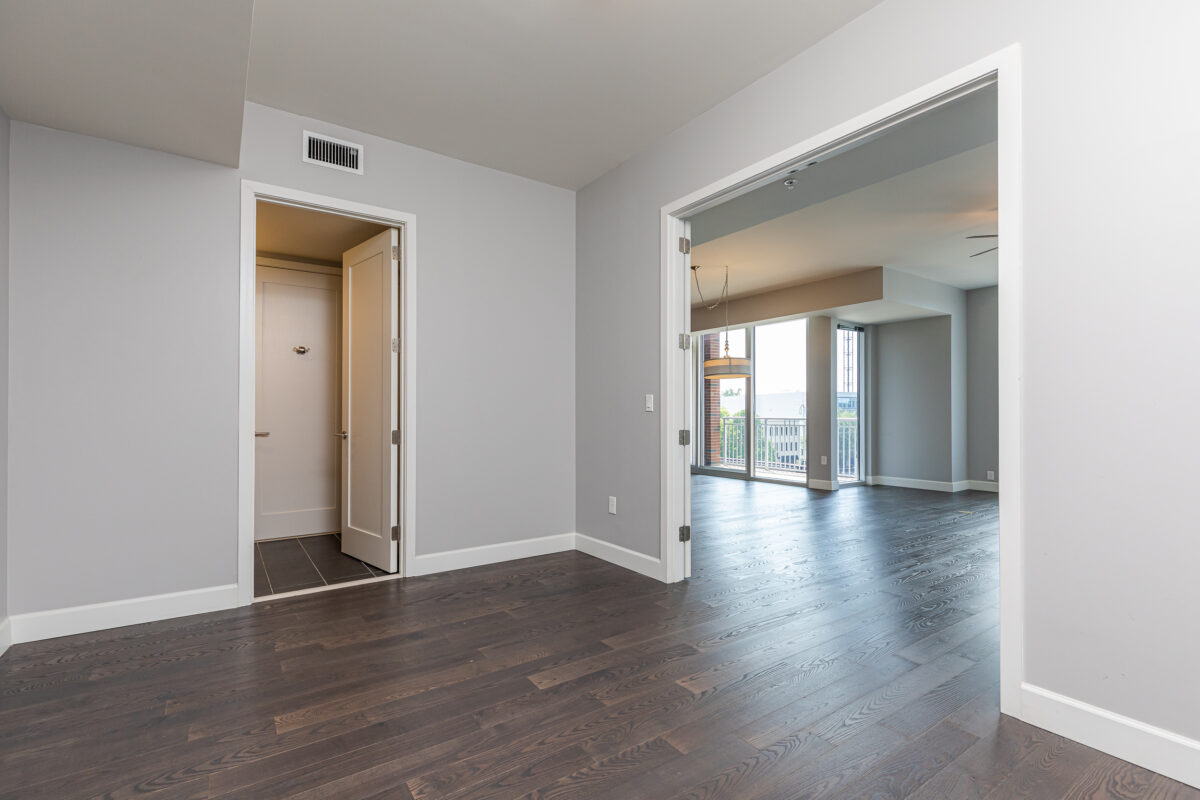
Residents of The Brookwood enjoy 24-hour concierge service in the beautiful lobby, and luxurious, resort-style amenities including a heated saline pool, state-of-the-art fitness center, clubroom, and an outdoor lounge area. This home offers the best of Buckhead living—walkable to the Beltline, shopping and dining, and located just between Midtown and Buckhead Village.
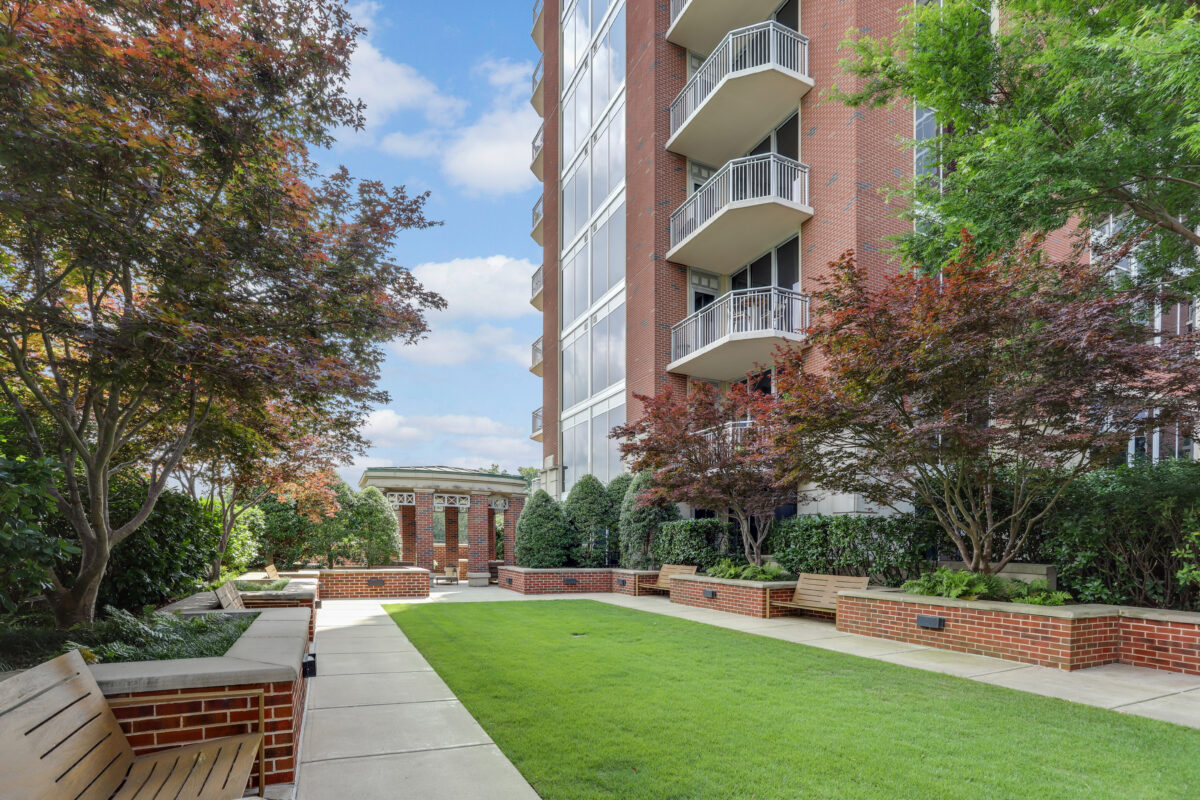

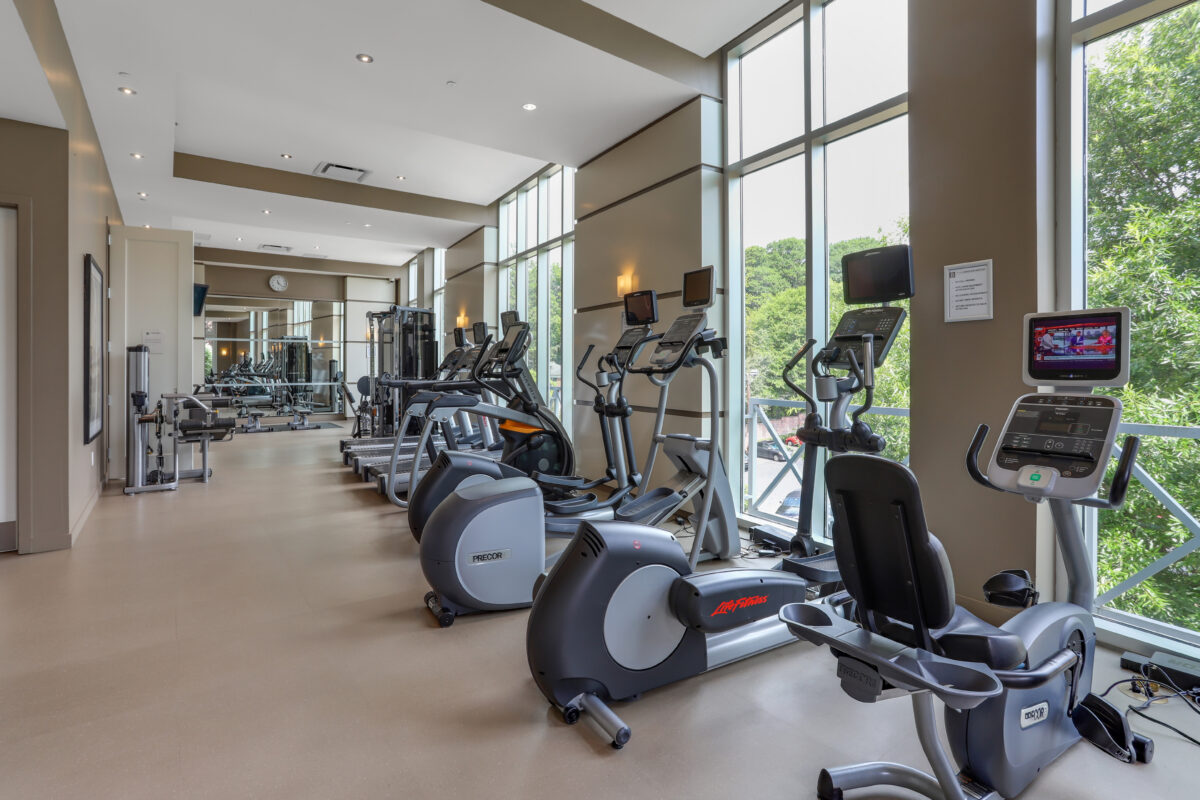
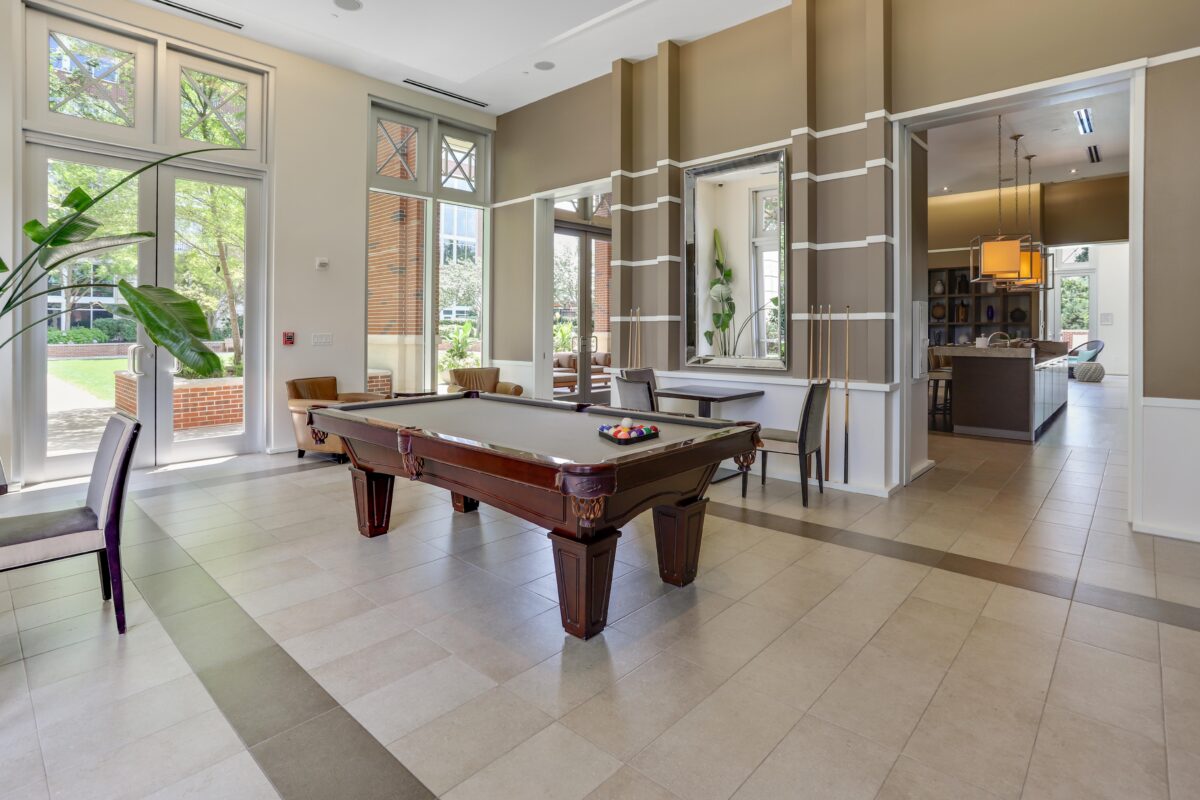
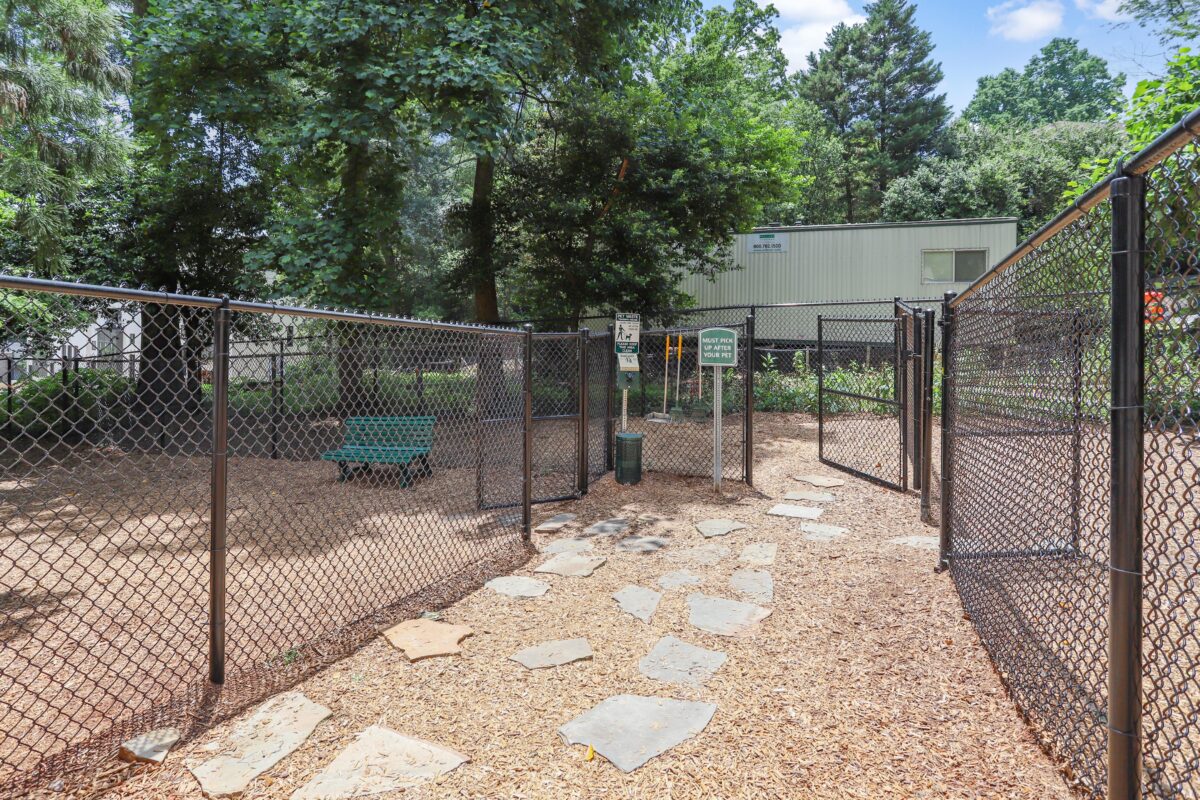

Walk everywhere! This spacious condo offers a central location and all the amenities you can imagine. The Brookwood is situated between Midtown and Buckhead on Peachtree Road. Easily walkable to great restaurants, convenient shopping, the Shepherd Center, and Piedmont Hospital.


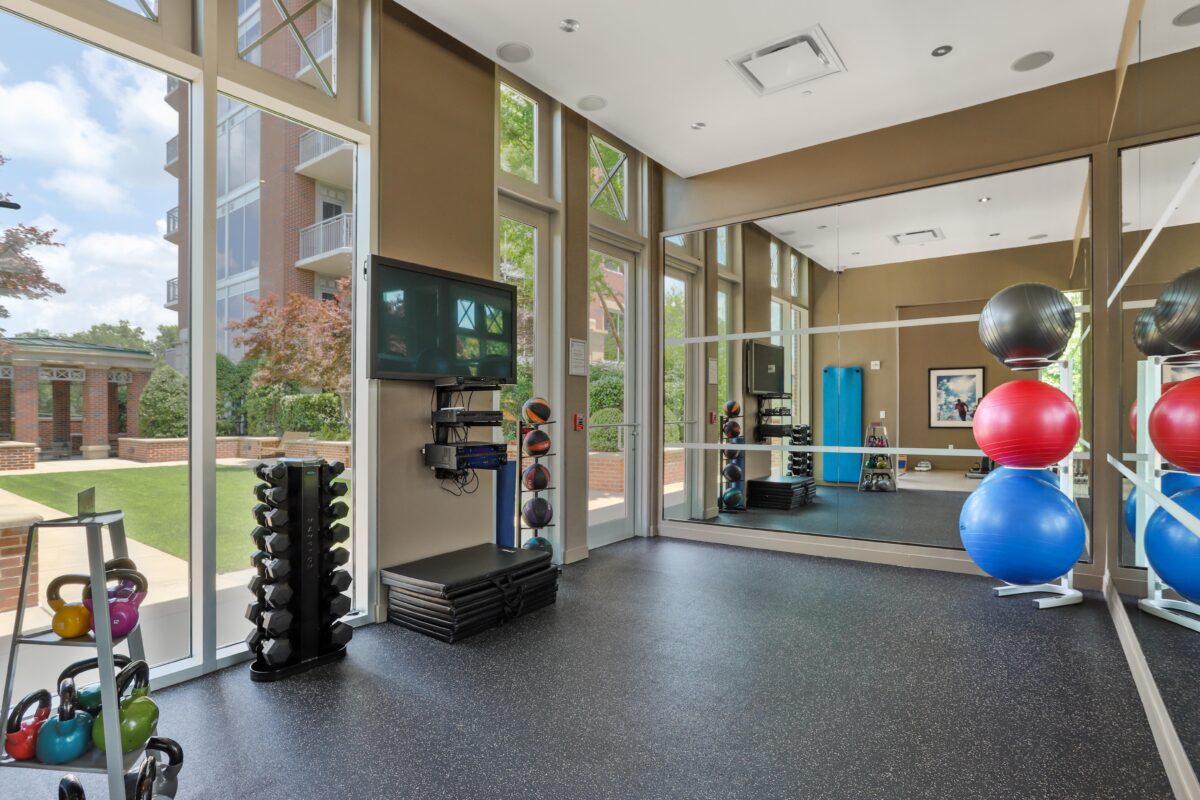


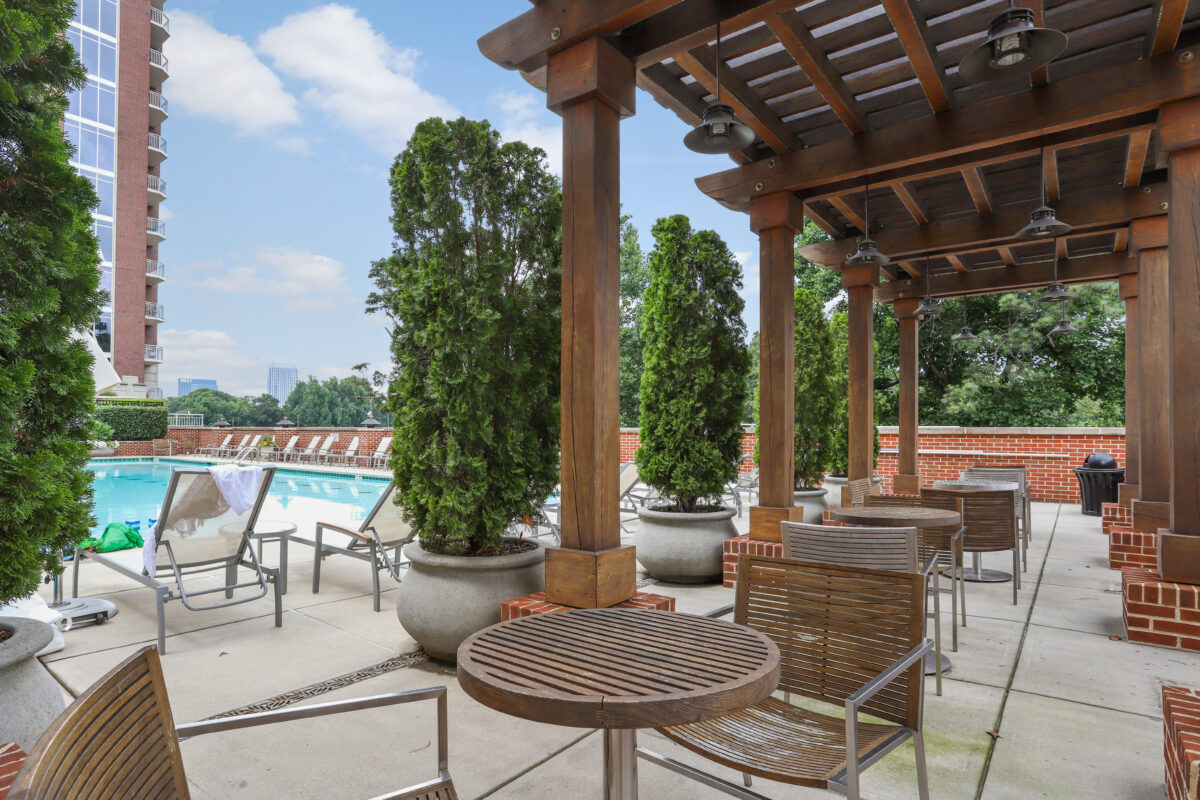



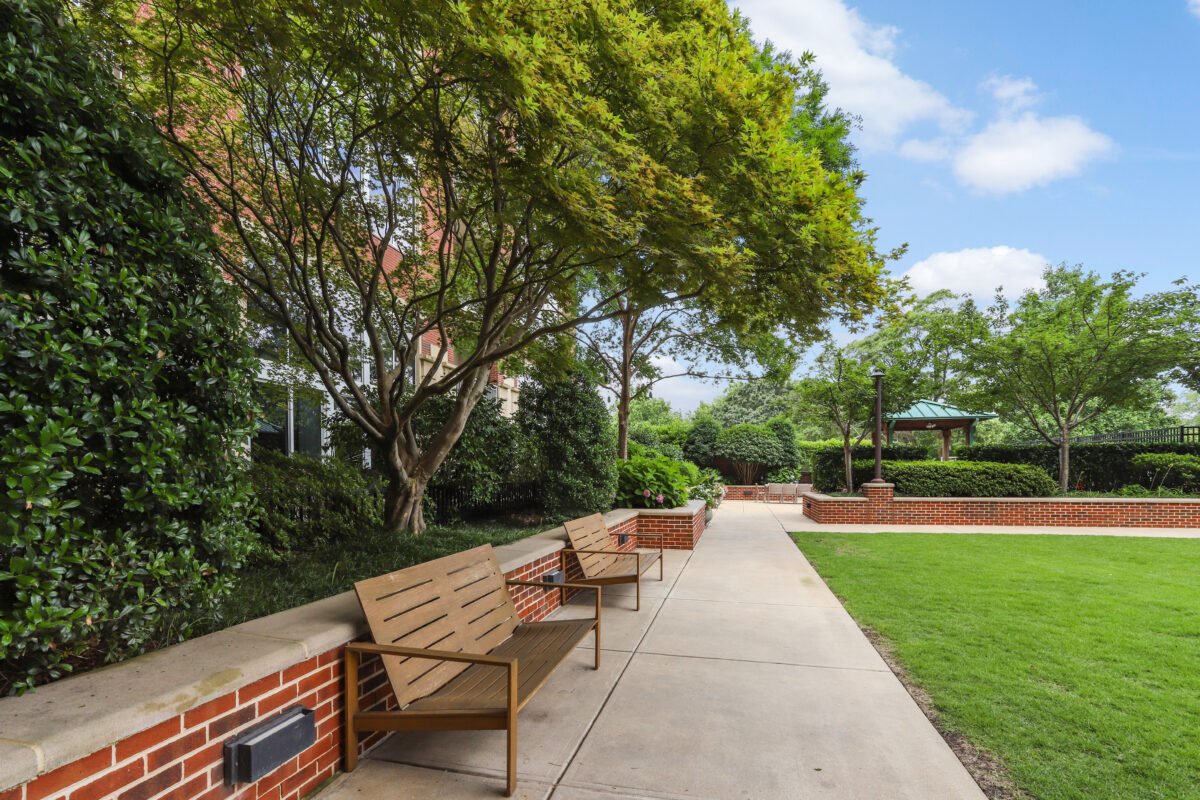


Homeowners at the Brookwood have access to amenities like a fitness center, saline pool, outdoor kitchen, coffee station, guest suites, underground assigned parking and available concierge services. The Brookwood is also the first LEED-Certified high-rise condo tower in Atlanta.
The light-filled corner unit has garden and city views from the 6th floor. An open floor plan enhances the sense of scale in the main living/kitchen space. The large living area flows easily into the kitchen and dining area, with beautiful hardwood floors throughout.
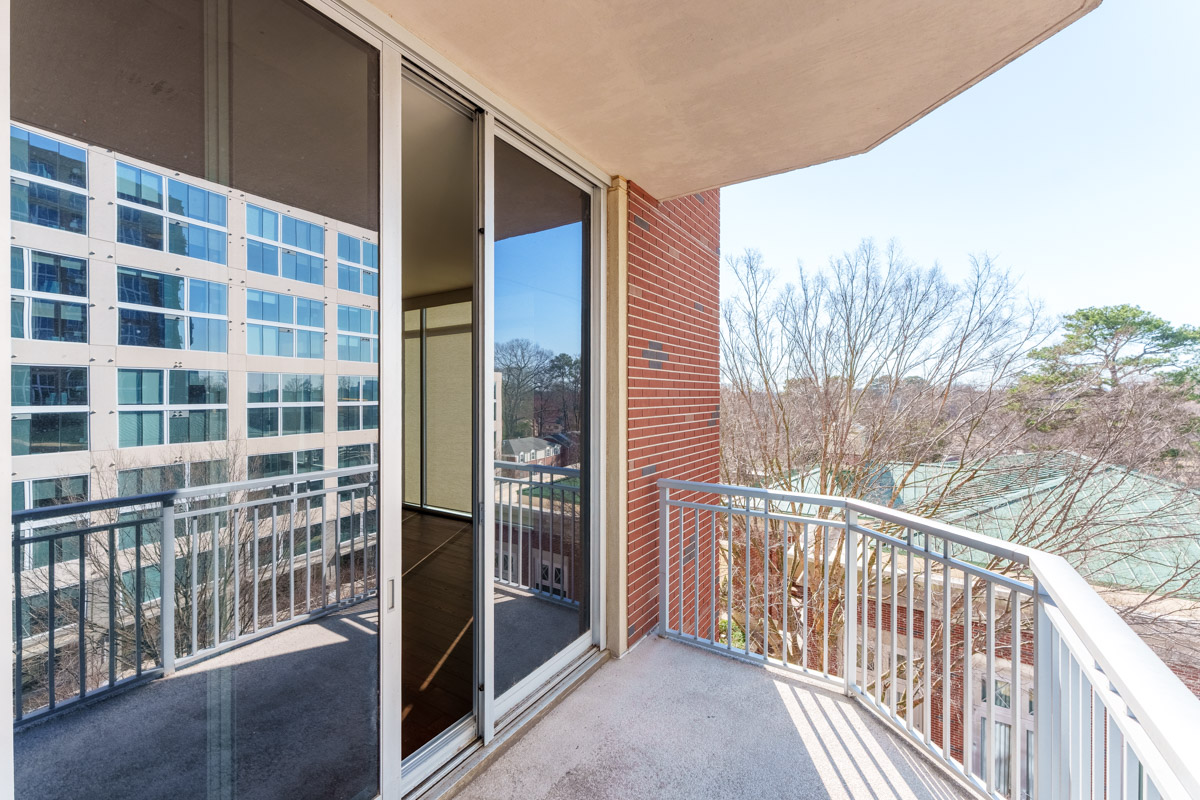
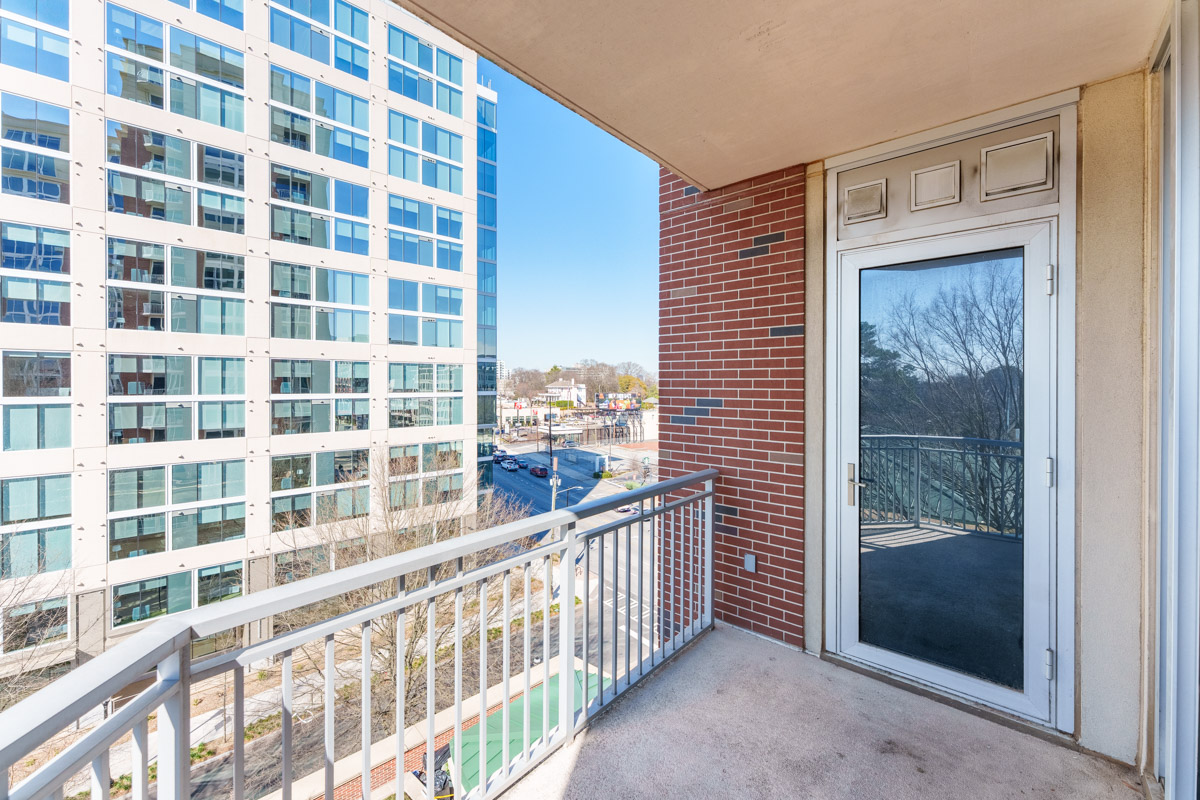
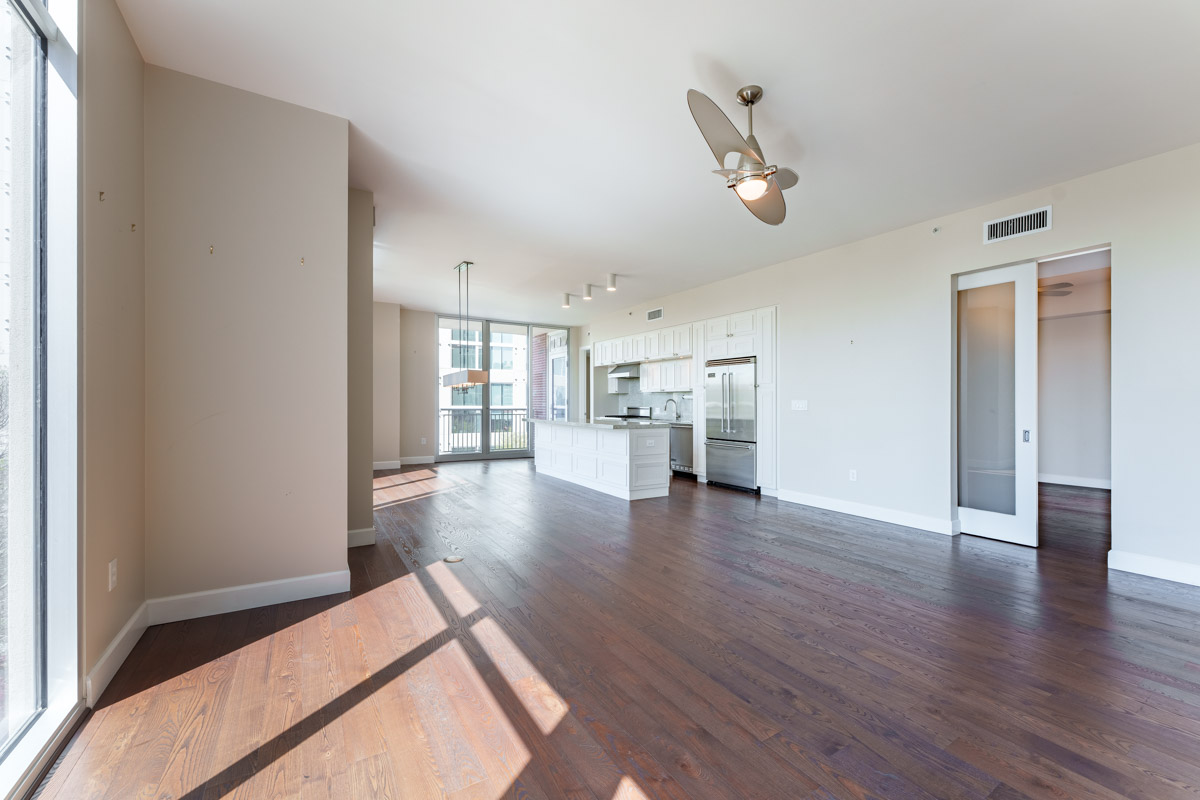
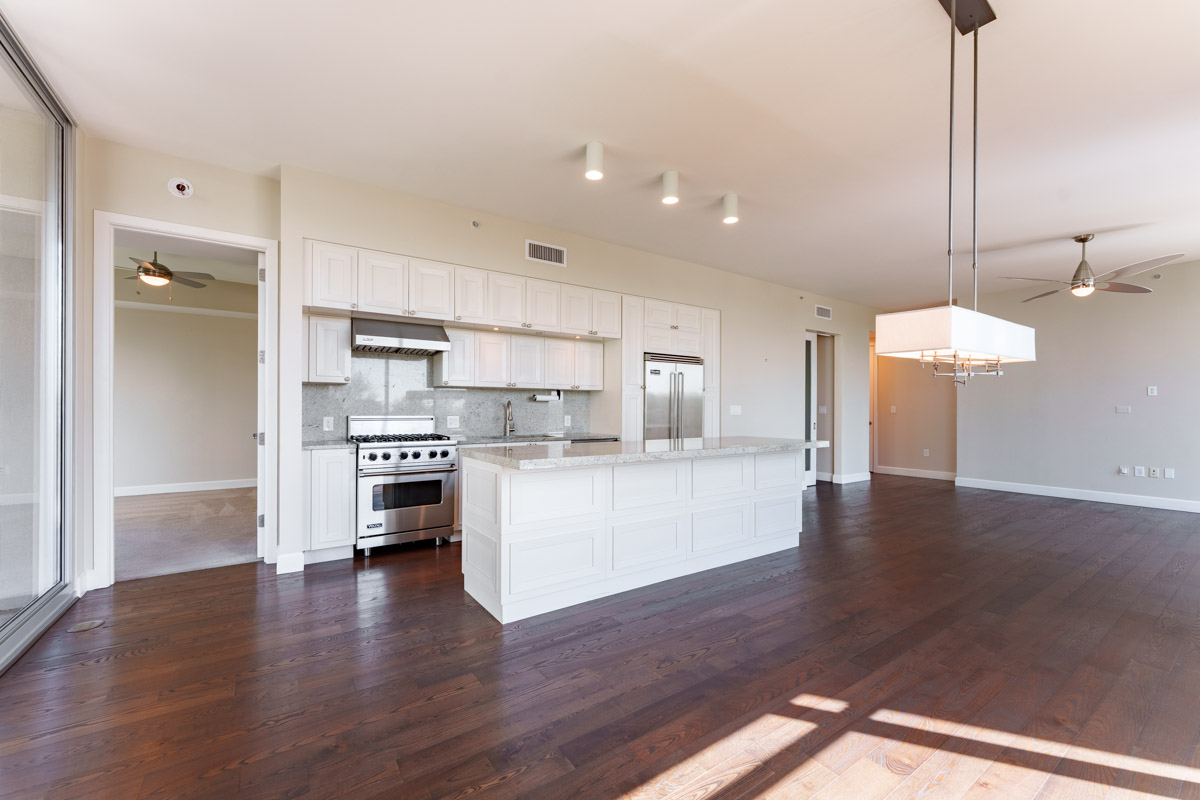
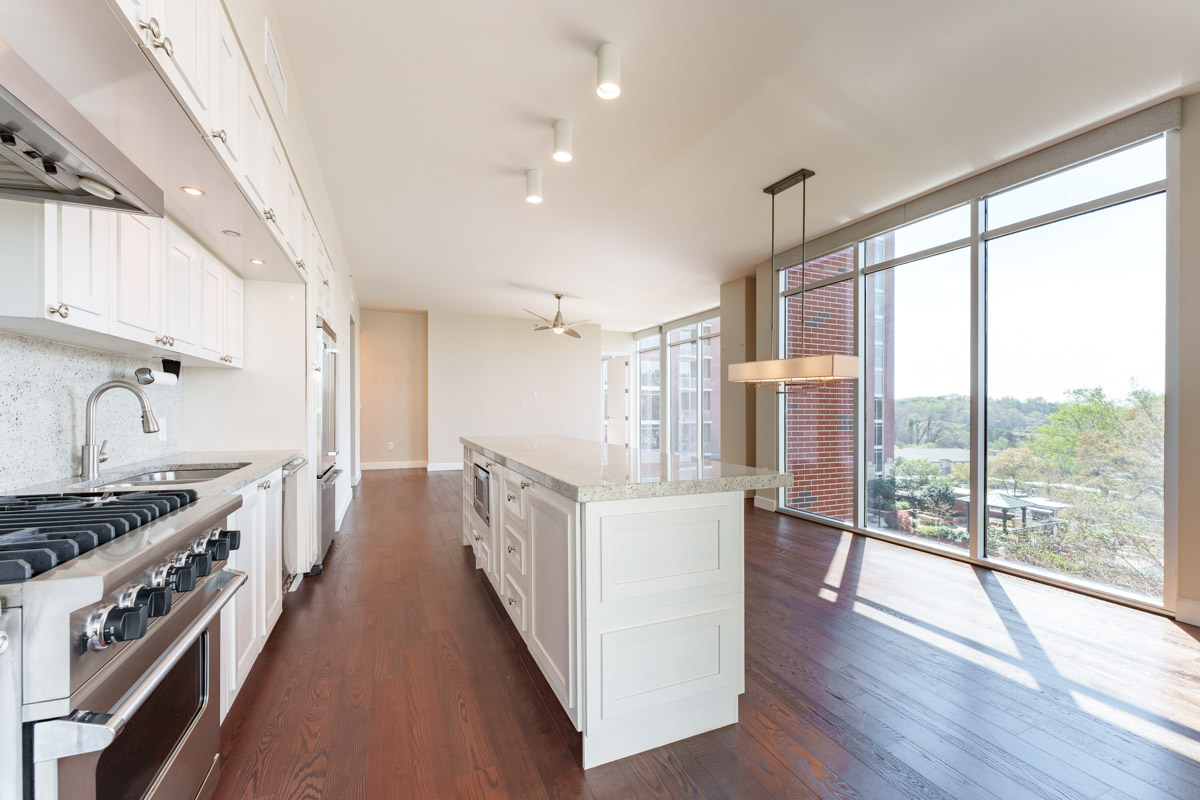

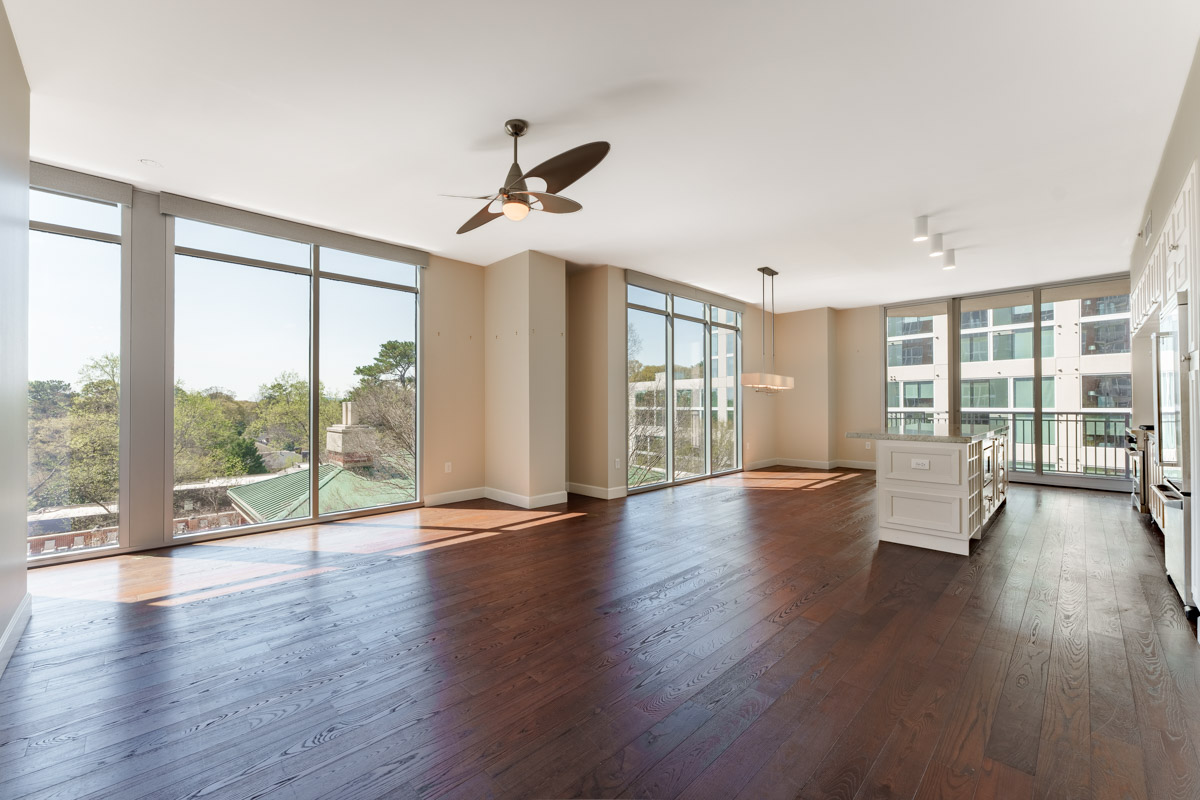
The kitchen features a spacious island with lots of storage, Viking appliances, and stone counter tops. A sliding door provides access to the outdoor balcony.
The primary bedroom suite includes a generous ensuite bath with a separate tub and shower, plus a large walk-in closet with custom built-in storage. A large window provides lots of natural light, and the suite includes private access to the outdoor balcony.
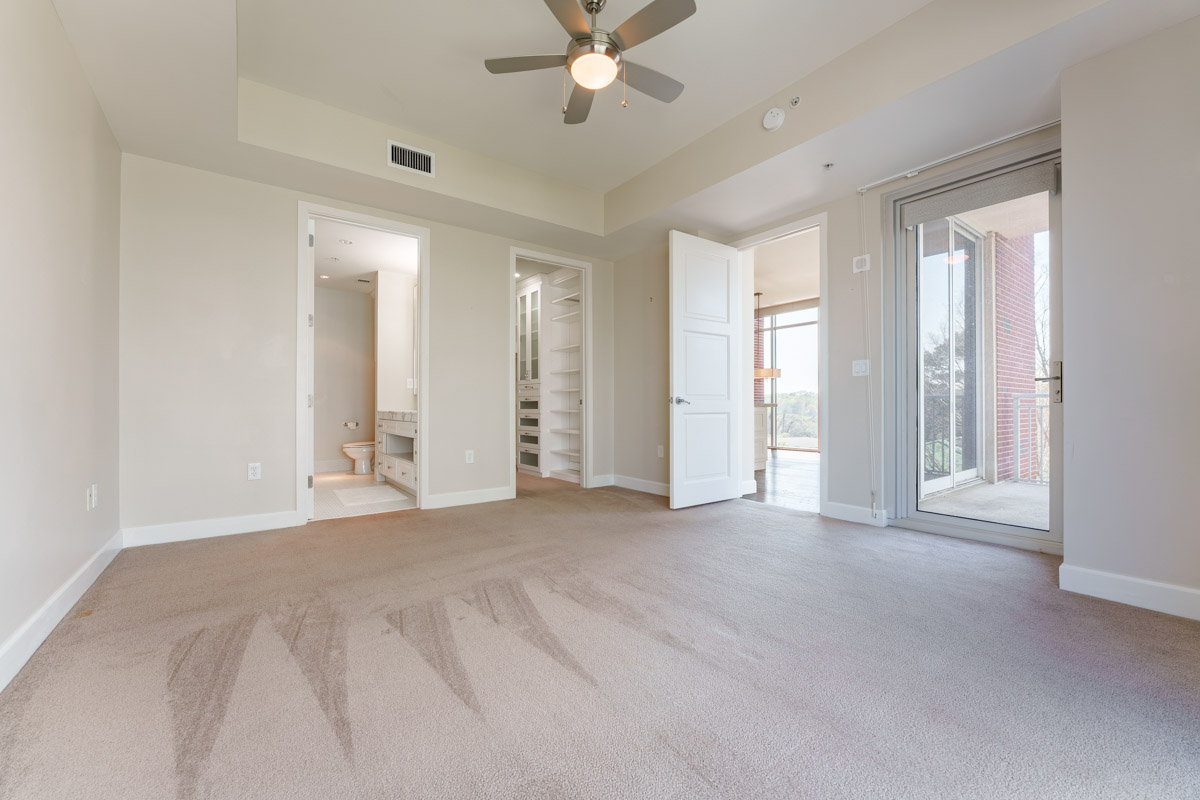
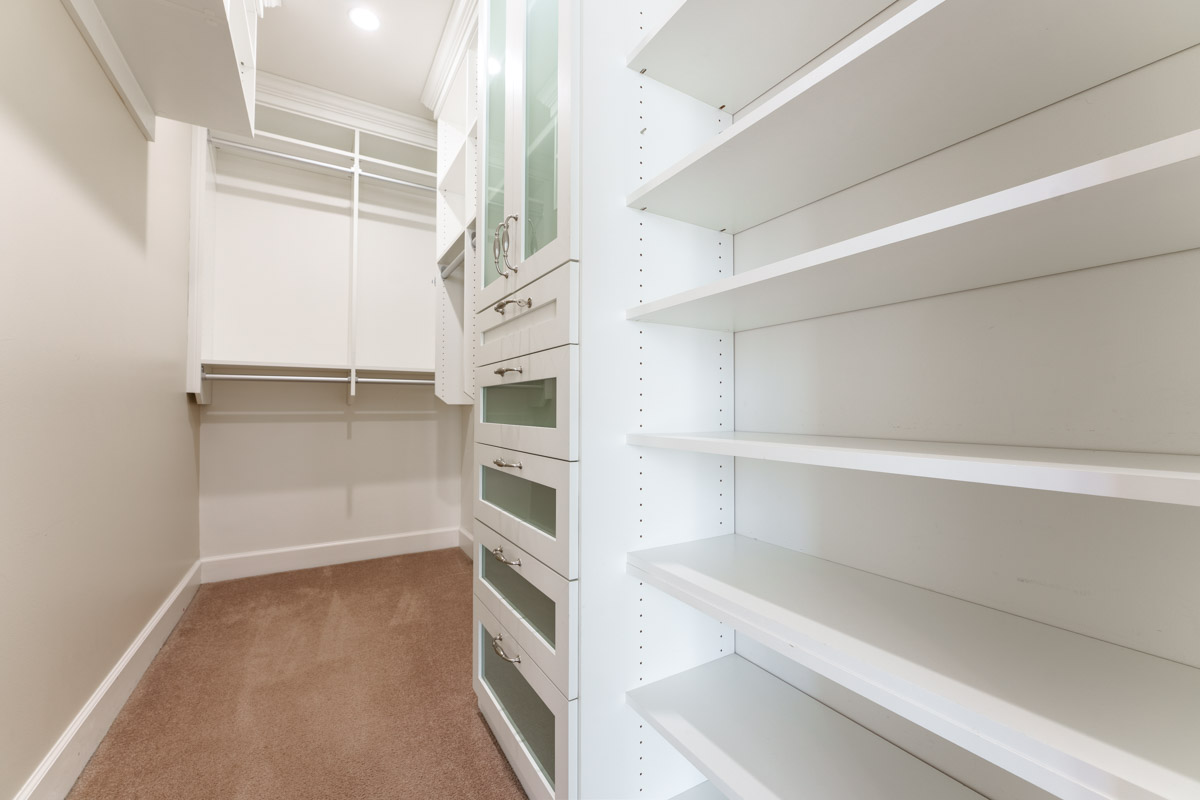

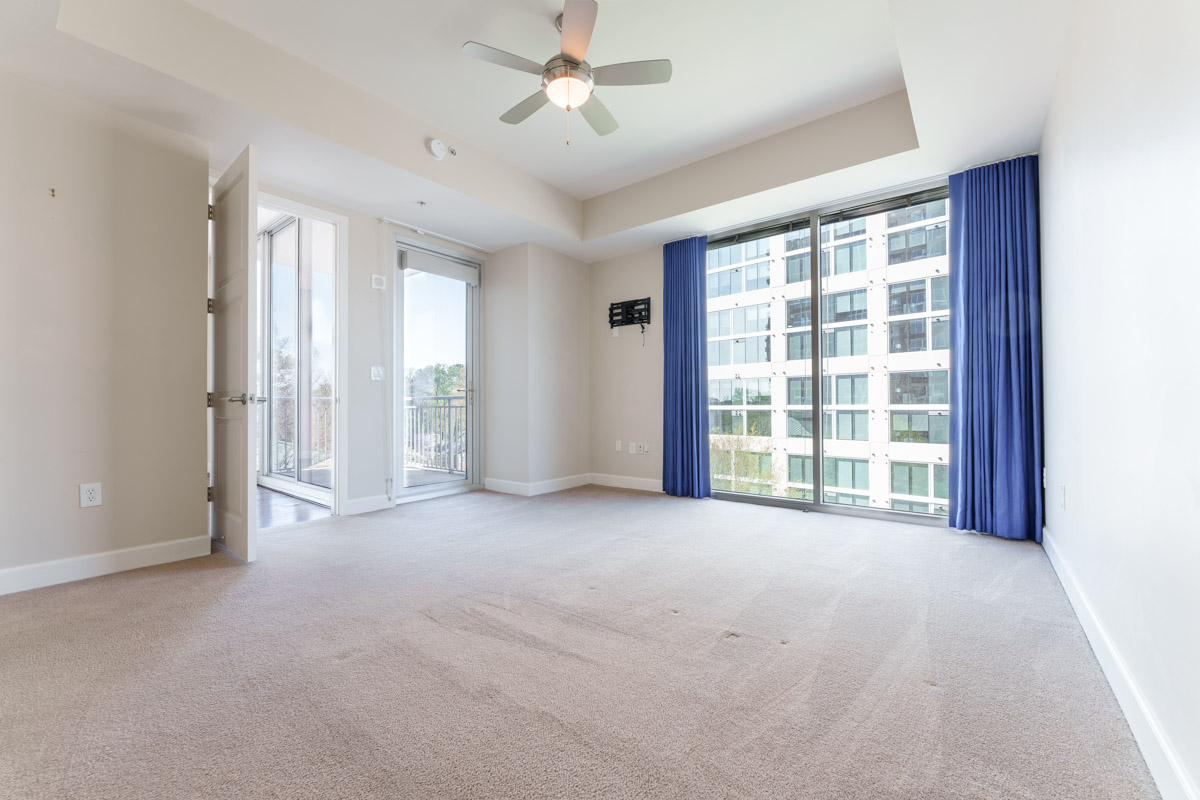
A second bedroom suite is on the opposite end of the main living space, making the layout very private for family or guests. The second bedroom has an ensuite full bath and a generous closet.
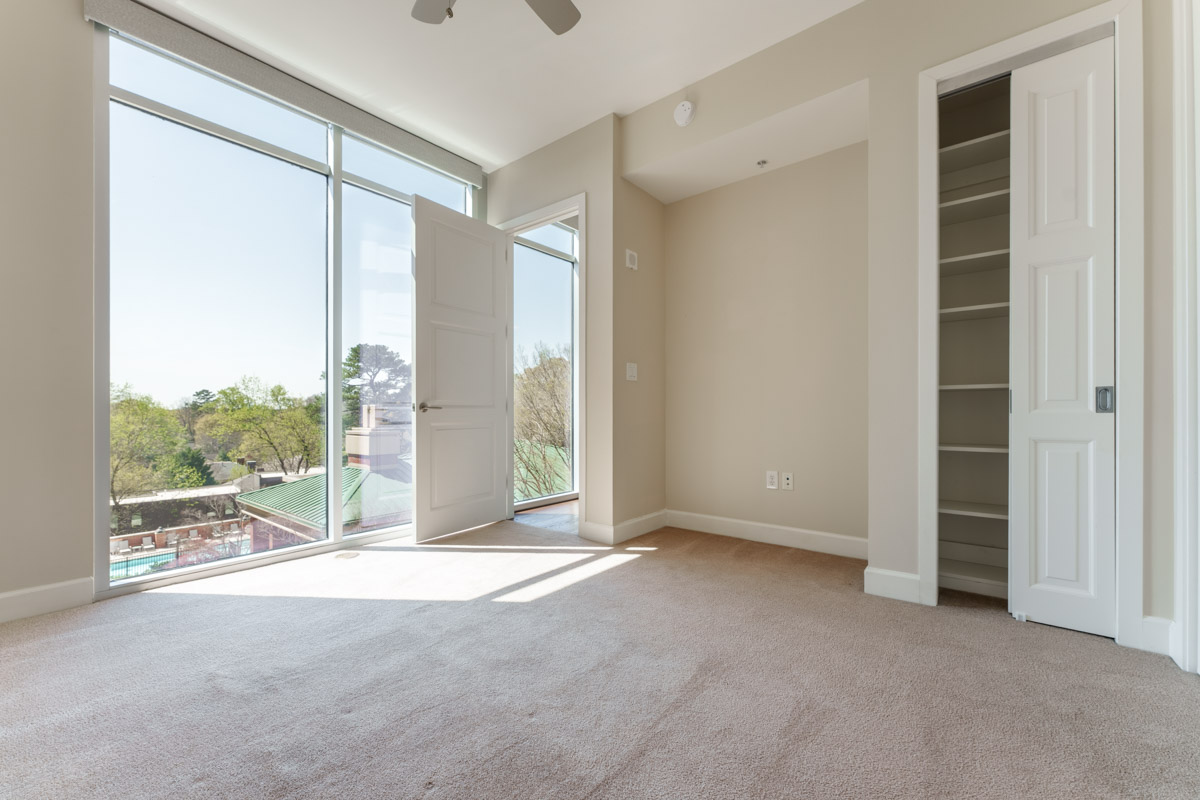
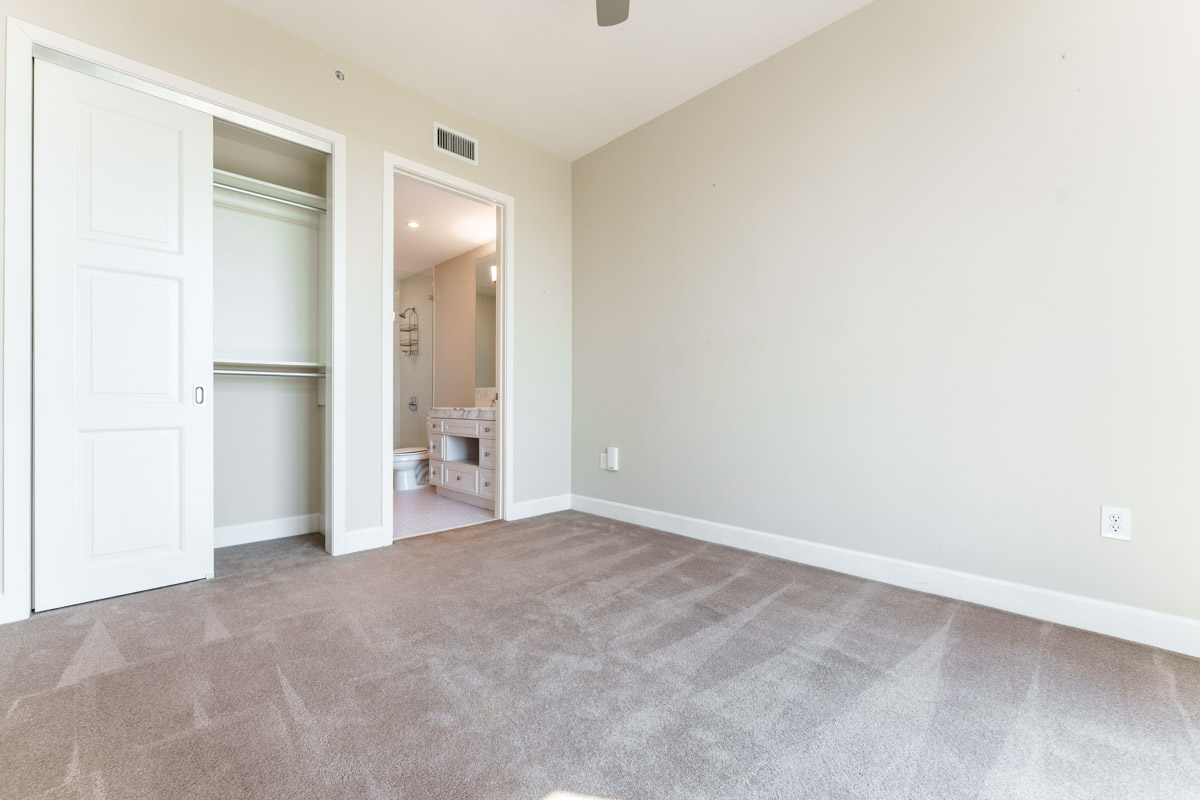
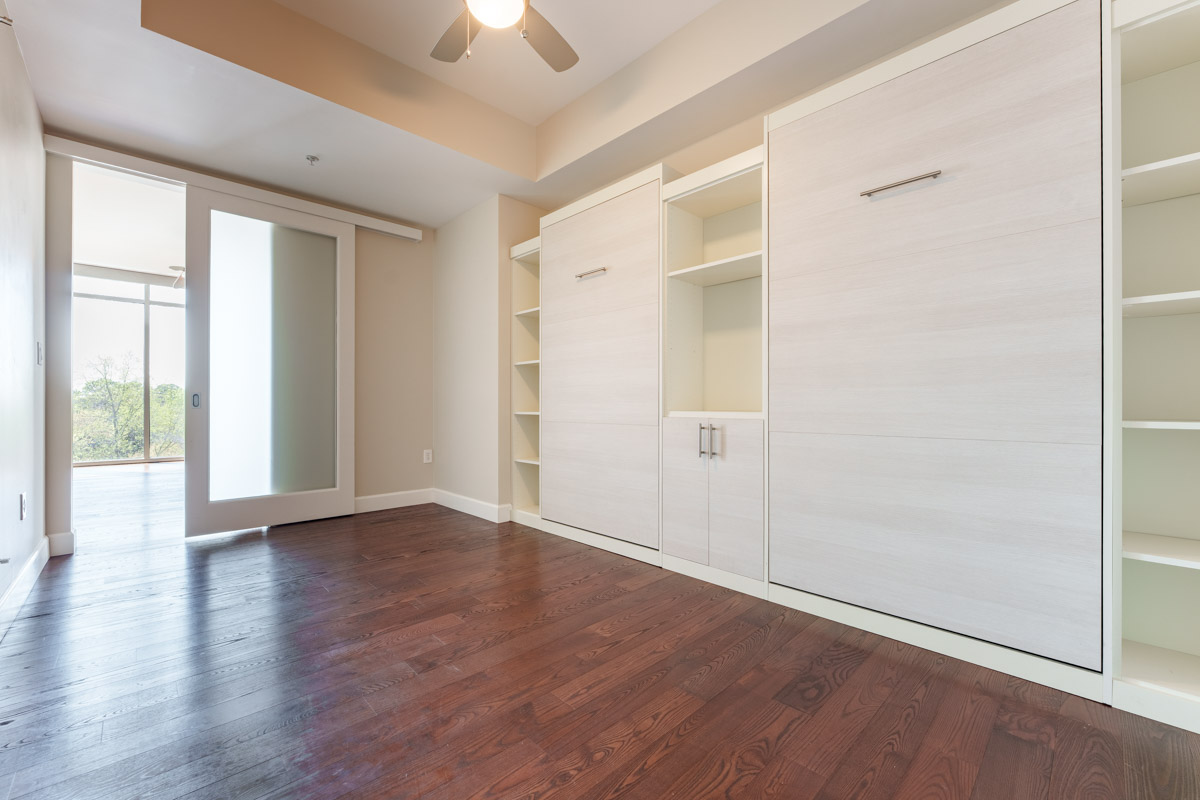
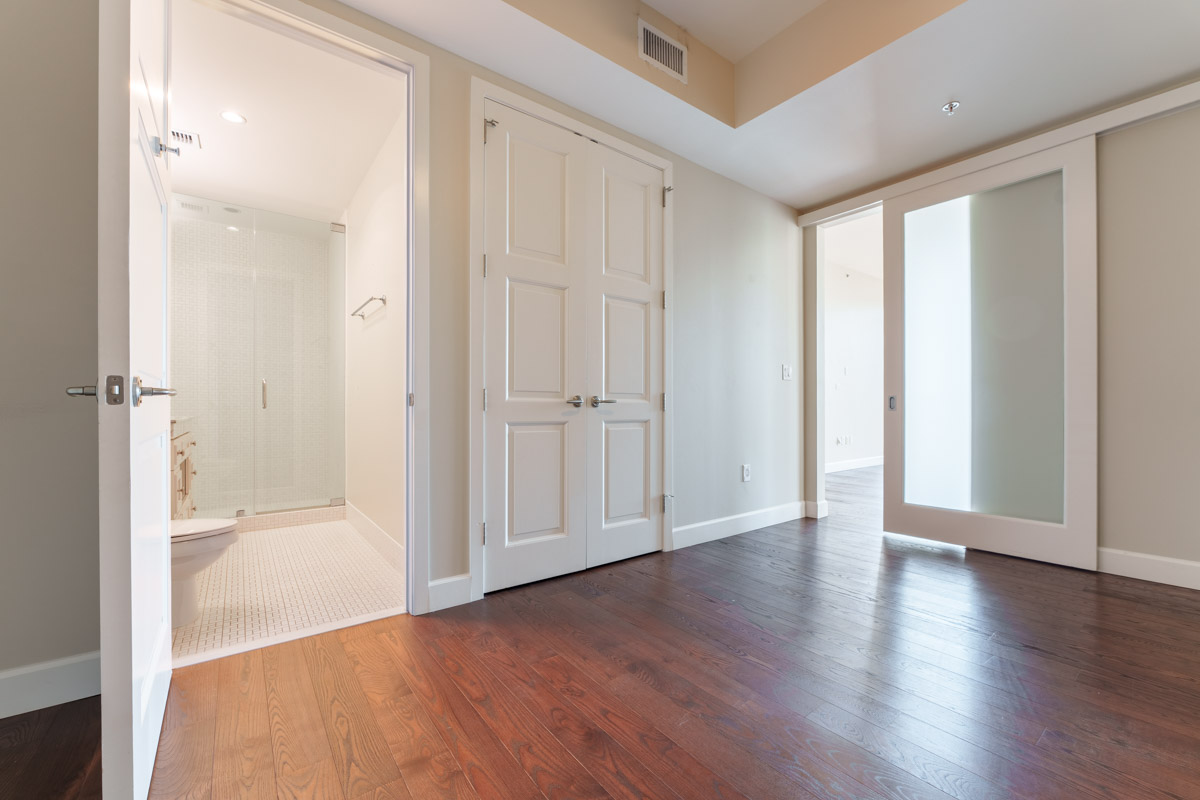
The third room is a flex space with multiple uses. It is an obvious choice for a home office or media room, while 2 built-in Murphy beds and an ensuite full bath make it the perfect guest room.
The new Arthur M. Blank Family Residences building is complete and will soon welcome its first guests. The 16-story tower is located just south of the Shepherd Center at 1860 Peachtree Road. Part of an extensive $360 million expansion and renovation of the Shepherd Center, the tower will double the Center’s housing with 165 new accessible units.
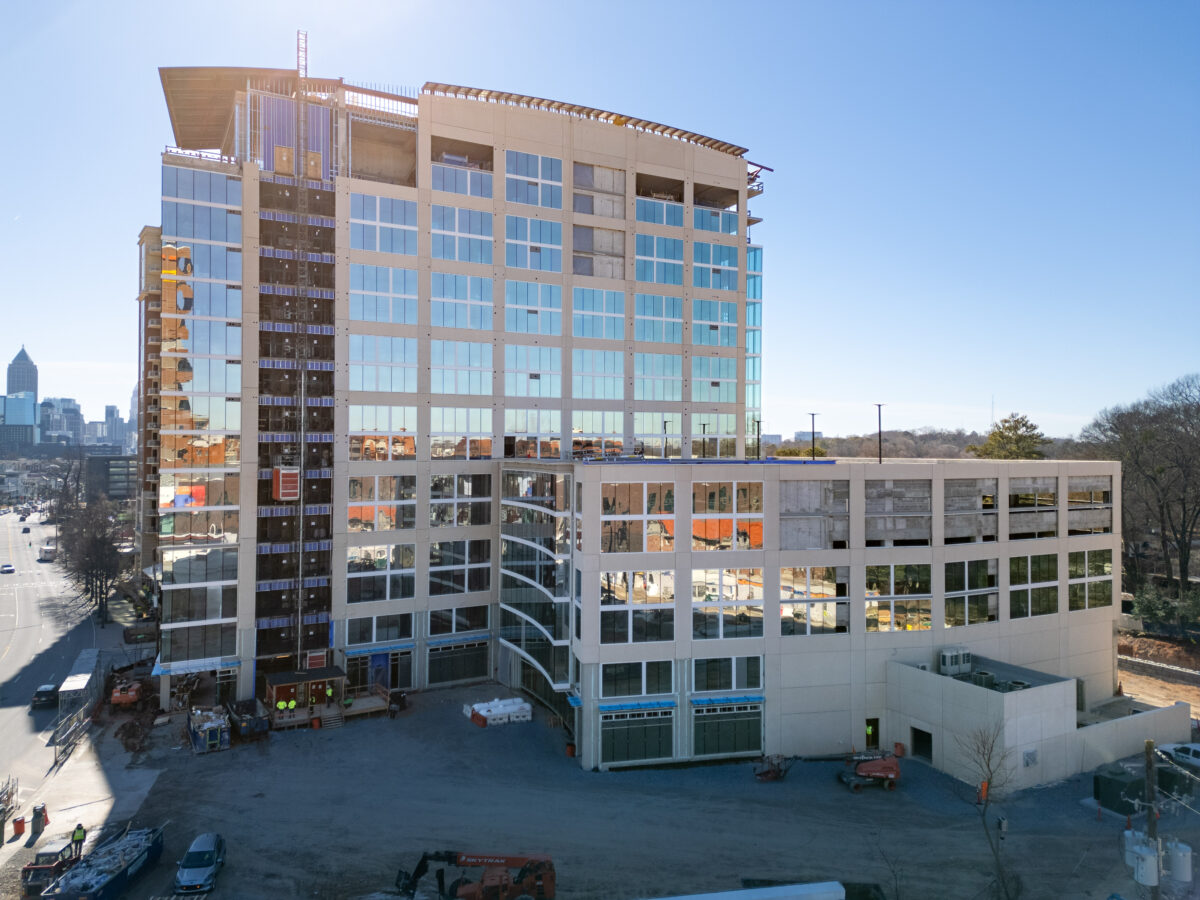
According to the Shepherd Center, “The new housing tower will allow families and day program patients who are receiving life-storing neurorehabilitation at the hospital and who live more than 60 miles from Shepherd Center to stay in donor-funded housing for the full duration of their loved one’s rehabilitation, helping ease the financial and emotional burden of being away from home.”
The new tower was officially opened in August of 2024, and will begin hosting patients and their families in October.
Home Depot co-founder and owner of the Atlanta Falcons, Arthur Blank is a long-time Shepherd Center donor. The Blank Family Foundation awarded a $50 million grant to fund the new Family Residences building. Earlier this year, Arthur Blank said in a statement. “Our family foundation is honored to support Shepherd Center in helping more families heal together. We hope that having a safe, accessible place to call home here in Atlanta while they are away from their own homes will help lift the incredible burden of these types of trauma in some small way so that families and patients can focus on their healing and each other at a time when that is the most important and most needed.”
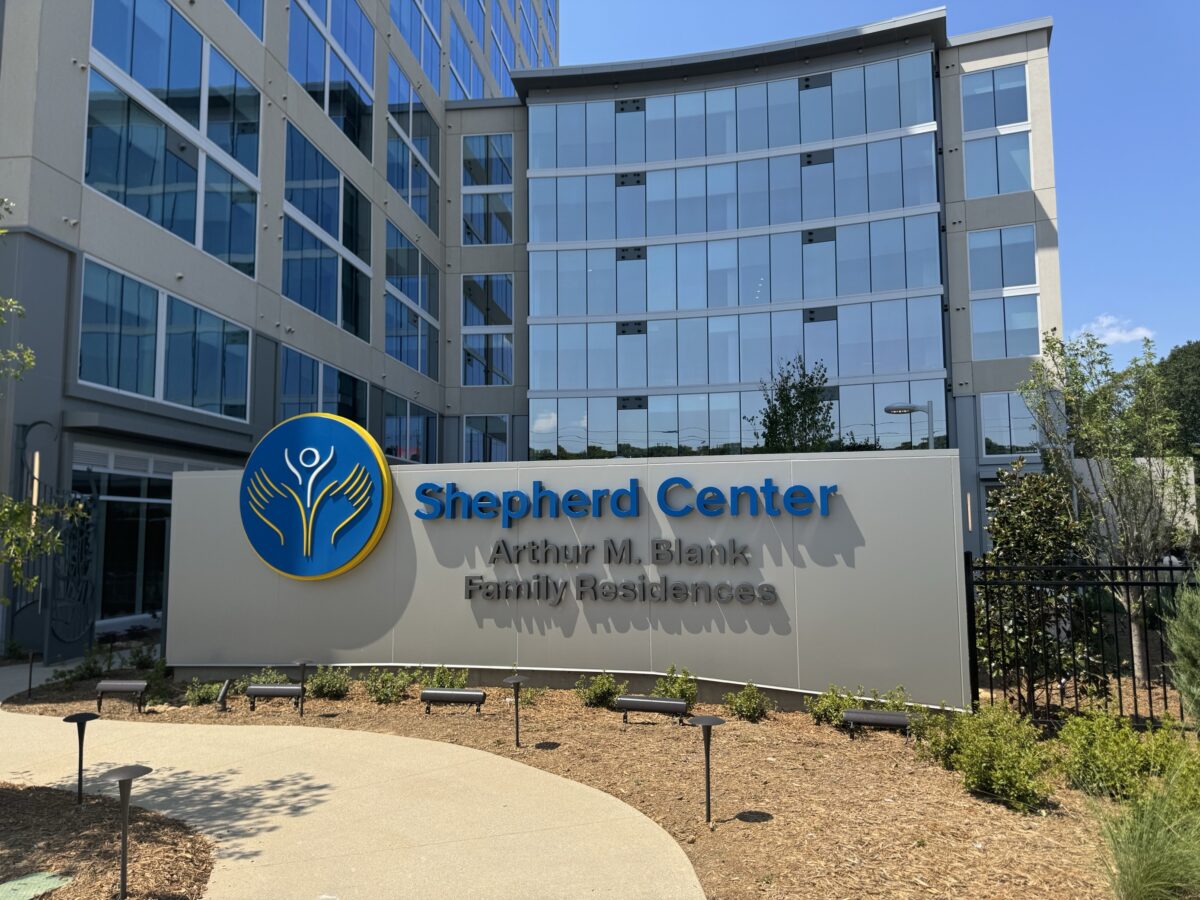
Shepherd Center improvements include renovation of the Center’s main campus to modernize patient rooms and expand the Center’s capacity, and the new Marcus Center for Advanced Rehabilitation.
The Marcus Center for Advanced Rehabilitation next door to the main Shepherd Center building is expected to open in early 2025. Funded by an $80 million grant from longtime supporter The Marcus Foundation, the new 30,000-square-foot Innovation Institute will allow the Shepherd Center to expand its day programs and outpatient services. Like his fellow Home Depot co-founder, Bernie Marcus and his wife Billi have been supporting the Shepherd Center for decades.
Part of the Atlanta BeltLine’s Northwest Trail now has a tentative route through Buckhead, while a controversial and complicated part at Peachtree Road will undergo months of further study.
The partial route selection, announced in a May 12 virtual community meeting by Atlanta BeltLine Inc. (ABI), means that survey and preliminary design and engineering work will immediately begin on some sub-segments of the trail. Construction would be years away, though ABI has a self-set deadline of 2030.
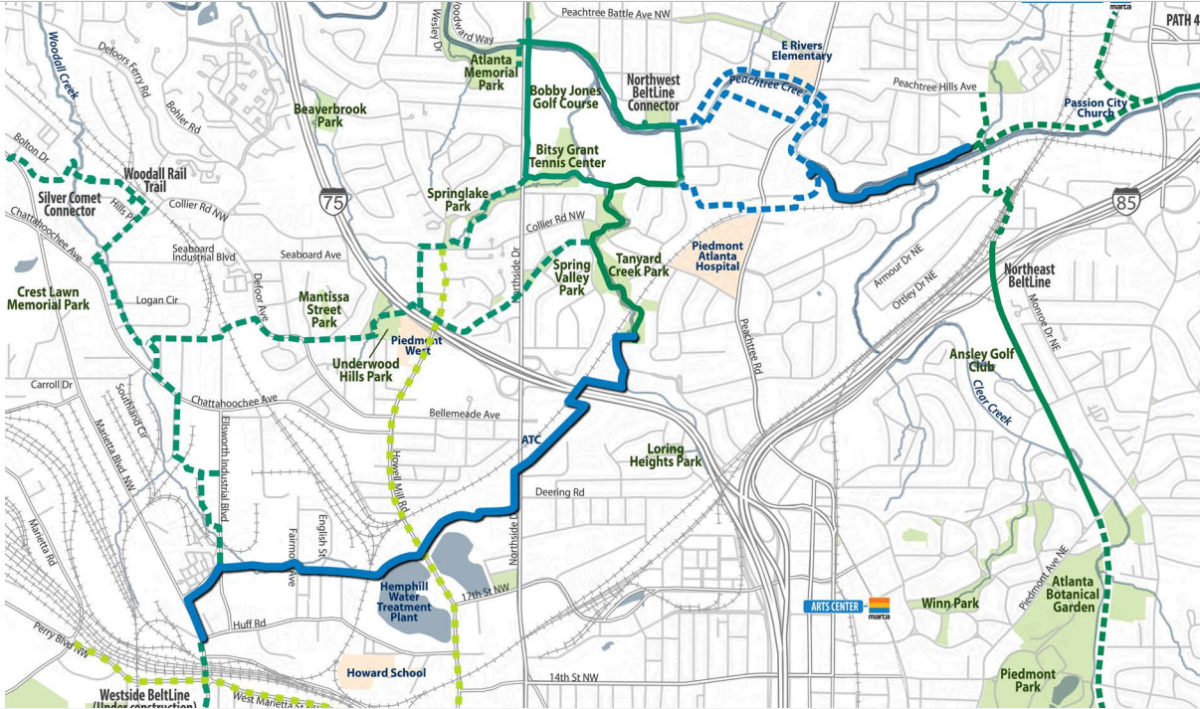
ABI engineer Shaun Green also said it is possible that, after further study, some segments of the trail may not be built – at least, not as part of the BeltLine. Other parties, such as the City or the PATH Foundation – ABI’s Northwest Trail partner – might fill in such gaps if they happen, he suggested.
The BeltLine is the 22-mile loop of trails, transit and green space being constructed around the city by Atlanta Beltline Inc. The Northwest Trail segment would run roughly 4.3 miles between the Huff Road/Westside Park area and the Northeast Trail, another segment on the drawing boards that would connect in Peachtree Hills. An existing, isolated portion of the BeltLine called the Northside Trail already exists around Atlanta Memorial Park, so Northwest Trail planning involves plugging new trails into the west and east sides of that.
ABI and the PATH Foundation have spent a year studying the feasibility of several alternative routes: four on the west side of Atlanta Memorial Park, and three to the east.
Planners have settled on a west-side route known as Corridor 2. It connects Huff Road and Ardmore Park/Tanyard Creek Park via Blandtown and Loring Heights/Berkeley Park. It would run past the Hemphill Waterworks and cross I-75 with an underpass bridge. A bridge-like segment along a channelized portion of Tanyard Creek is also a possibility.
The east-side route is still undecided. It’s a complicated tangle where planners are still unsure how to cross Peachtree. And local residents are giving heavy resistance to concerns about property and security impacts, as the Atlanta Journal-Constitution reported. ABI says two to three months of further study is needed, with another community meeting coming in August.
However, all proposed east-side routes dovetail to the same area along Peachtree Creek to Kinsey Court in Peachtree Hills. ABI says that sub-segment is certain enough to begin surveying and preliminary design and engineering as well.
For planning and construction purposes, the Northwest Trail route is divided into five segments. Segments 1 and 2 are the east-side trail and Segments 3, 4 and 5 are the west-side trail. Three of those segments will go into the immediate preliminary design work:
Segment 2 is the still undetermined route between Atlanta Memorial Park and Peachtree Creek. Segment 4 runs between English Street and Trabert Avenue.
ABI has said the Northwest Trail is the most complicated part of the trail to plan because of the density of existing development and infrastructure that includes highways and railroad lines. “The Northwest corridor is really our final frontier,” said Kim Wilson, ABI’s vice president of design and construction, in the meeting.
As part of its partial route selection, ABI produced a 102-page feasibility report on how the options were vetted. That included many criteria, from funding flexibility and cost to safety and community impact.
Public feedback was another factor, and ABI got a lot of it, especially regarding the contentious east-side trail. Clyde Higgs, ABI’s president and CEO, made an unusual appearance at the start of the meeting to assure the audience its concerns were being heard. He said ABI was “encouraged” by the large amount of feedback, “even those of you who have written to us through their attorneys.”
A question-and-answer session in the meeting included several comments further highlighting concerns that the trail would make homes more accessible to criminals or lower property values. ABI officials variously questioned some of those premises and said there are design mitigations, but it’s too early to go into such details.
Planners understand that “we are changing the status quo,” said ABI engineer Shaun Green. “We are changing the existing condition. That’s our purpose, really. I’m sorry you’re feeling as impacted as you are.” He said more details would come through the process, which will include more public and stakeholder meetings.
As for construction timing, Wilson said it typically takes a year to finish design and 18 months of construction per mile of trail. But she also noted that the Northwest Trail is especially complicated. She said building some of its segments could take two to three years. But it is impossible to know any timeline for sure at this early stage.
Even less certain is the light-rail portion of the BeltLine, which has not been built anywhere yet and faces even more complex challenges in the Northwest quadrant. ABI has said it is committed to transit and hopes to build it in partnership with MARTA by 2050. The Northwest route mostly would not match the trail and instead would have to go along existing railroad corridors, said Green.
Meanwhile, Buckhead’s portion of the Northeast Trail is also in a planning stage and also facing complicated streets and infrastructure. That trail will connect the Lindbergh Center MARTA Station to Piedmont Park. A segment is under construction between the park and Plasters Avenue where a preliminary, unpaved trail runs.
For more details, including the meeting video and presentation, see ABI’s website.

Buckhead’s Atlanta Police Department precinct is seeing a changing of the guard as its current commander has received a promotion to deputy chief.
Andrew Senzer, who has led the Zone 2 precinct since November 2019 with the rank of major, will head APD’s Strategy and Special Projects Division, he announced at an April 7 meeting of the Buckhead Public Safety Task Force.
Major Ailen Mitchell, who has served as Senzer’s assistant since 2020, will be the new Zone 2 commander, Deputy Chief Timothy Peek said in the meeting.
The transition will happen on April 14, according to APD. The current head of the Strategy and Special Projects Division, Deputy Chief Darin Schierbaum, is being promoted to the vacant position of assistant chief of police.
Senzer was Buckhead’s police commander through the historic COVID-19 pandemic and accompanying crime spike, including the May 2020 rioting and looting in local business areas that spun out of Black Lives Matter protests about the Minneapolis police murder of George Floyd.
He also led through the beginning of the Buckhead cityhood movement that based itself on crime concerns. While crime spiked, Senzer took a zero-tolerance approach and Buckhead continues to have the city’s lowest crime rate.
“It really has been an honor to serve as the commander of Zone 2,” Senzer said in the task force meeting. “In my 26 years [in policing], this has probably been the most challenging assignment I’ve had.”
He said his new role will be “a little behind the scenes” but that he will “not be a stranger” in Buckhead.
Peek said APD is “ecstatic” about Senzer taking on the deputy chief role.
Mitchell, according to his APD biography, has been with the department since 2006. He previously commanded the SWAT team and, like Senzer, once served on the Red Dog unit, an anti-drug squad disbanded in 2011 after controversial incidents like an illegal raid on the Atlanta Eagle gay bar. Among his other work was the Gang Unit and the Auto Theft Task Force.
Mitchell became Zone 2’s Criminal Investigations Unit commander in 2018 and its assistant commander in 2020.
Zone 2 is headquartered at 3120 Maple Drive in Buckhead Village.
Update: This story has been updated with information from APD about the transition.